Foodwise

Welcome to the 51st edition of Foodwise
In our last edition, we invited our readers to complete a survey in order to help us continue to improve Foodwise.
Thank you to everyone who participated, the response was encouraging.
Overall, the feedback we received shows we're hitting the right mark with digital Foodwise with many of our readers supporting the new format as well as the timeliness and relevance of the content.
In line with our commitment to refining and improving Foodwise, we have addressed some suggestions that were made regarding the ability to more easily navigate and access a printable version of the document. You will note the addition of print icons in the document header in this edition.
As always, we welcome your ongoing comments and feedback, so please feel free to drop us a line with any additional suggestions.
New resource hub for managing allergens
The National Allergy Strategy has released a new resource hub – www.foodallergyaware.org.au – to make finding information about managing food allergies easier.
When it comes to managing food allergies, everyone has a responsibility – consumers, food service providers, health professionals, environmental health officers/authorised officers and legislators.
Although there is a food service specific section, this site is not just for people working in food service. This resource hub aims to promote the message of shared responsibility whilst at the same time, make it easy to find relevant information and resources to help manage food allergies. The site links to credible resources and information including the National Allergy Strategy’s new online training for cooks and chefs.
All about Allergens: The next step for cooks and chefs has been developed as a follow-on course to the first All about Allergens course, which should be completed first. The new course has been developed in conjunction with chefs and cooks with experience in commercial kitchens.
All About Allergens: The next step for cooks and chefs, focuses on food preparation, handling and storage, and highlights the importance of effective communication between the kitchen and other staff and consumers with food allergy. Through engagement with cooks and chefs, the course also alerts cooks and chefs to common food allergen management issues and how to overcome them.
All about Allergens: The next step for cooks and chefs is a free online course with free downloadable supporting resources available from: www.foodallergytraining.org.au
Allergy & Anaphylaxis Australia launch free travel resource - translated chef cards
When travelling overseas, it may be difficult at times to verbally communicate your allergy and ask a range of questions about the food, ingredients and preparation methods.
To assist with this communication, Allergy & Anaphylaxis Australia has translated their Chef Card into 21 different languages that can be used when travelling, eating out in countries where English may not be the spoken language, and when dining in culturally diverse restaurants in Australia.
The cards can also be used by Australians with linguistically diverse backgrounds to help translate their allergens into English.
Allergy & Anaphylaxis Australia has also translated some common phrases to have on hand when travelling.
The cards are FREE and are available to download via the Allergy & Anaphylaxis Australia website.
Allergy & Anaphylaxis Australia’s original editable Chef Card (English) is also available on their website for download:
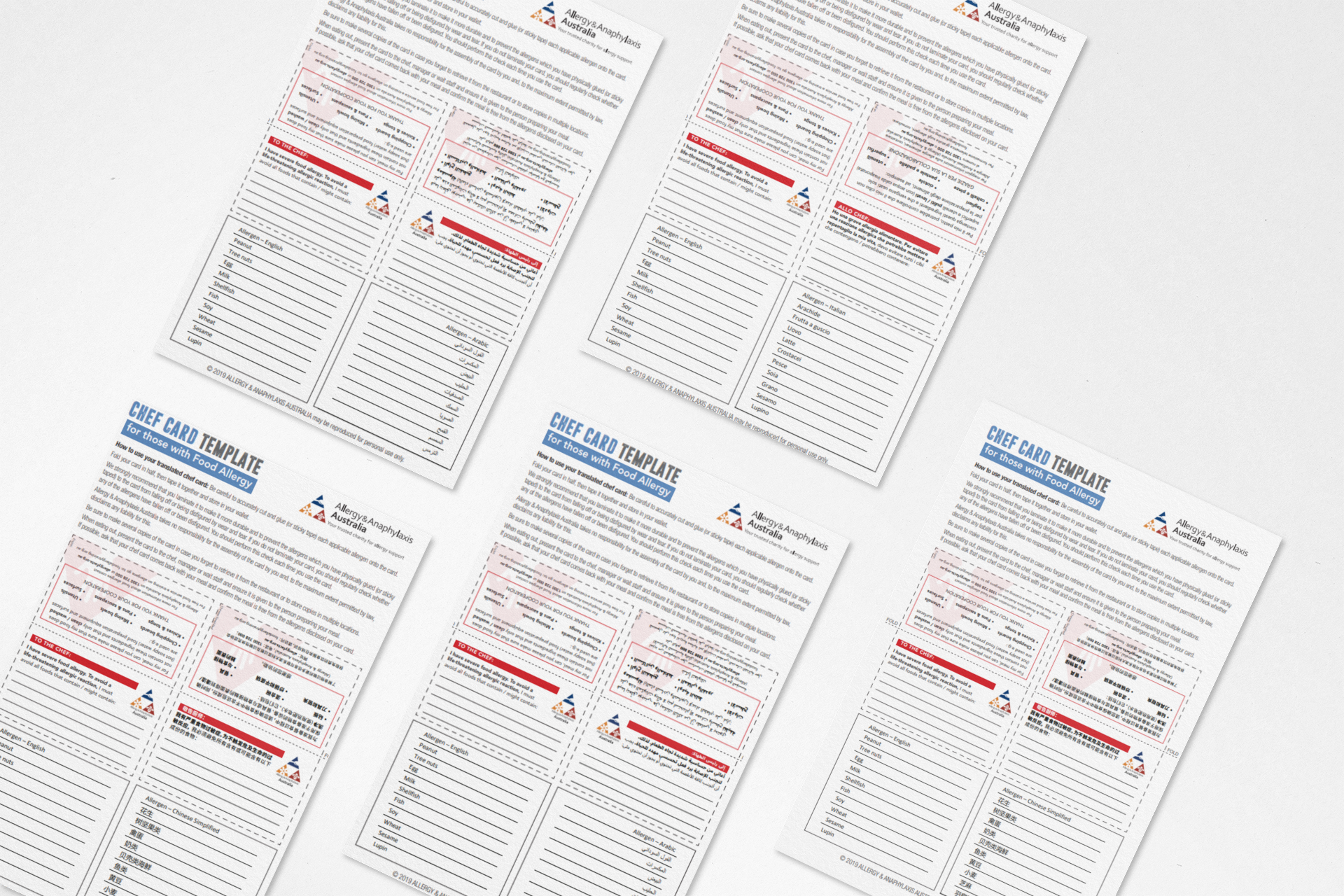
The cards are FREE and are available to download via the Allergy & Anaphylaxis Australia website.
The cards are FREE and are available to download via the Allergy & Anaphylaxis Australia website.

Translated cards are FREE and are available to download via the Allergy & Anaphylaxis Australia website.
Translated cards are FREE and are available to download via the Allergy & Anaphylaxis Australia website.
Property identification reforms - enhancing agricultural traceability
Reforms to the Property Identification Code (PIC) system have been proposed following a review into national traceability systems.
The proposed reforms, led by the Australian Government Department of Agriculture via existing industry and NSW Government forums, are aimed at developing a nationally consistent system for the allocation and use of PICs across properties producing livestock, and plants and plant products.
The aim is to improve traceability and ensure ongoing export market access for our agricultural produce.
A PIC is a unique eight character code issued by Local Land Services to identify a property. With consumers increasingly demanding more information about the safety, quality, provenance and sustainability of their food, PICs play a vital role in supporting traceability systems by identifying those properties involved in production, processing and distribution.
Why you need a PIC number.
PICs are integral to the National Livestock Identification System (NLIS), which is Australia’s scheme for the identification and tracing of livestock. Better traceability results in better returns at the farm gate, and promotes efficient and effective management and eradication of pests, disease or food safety incidents.
The most significant proposed change for industries and producers in NSW is to require a PIC for properties producing certain plants/plant products that are part of the supply chain.
This would be based on agreed threshold levels (eg. the quantity of product being produced or the size of the land under production) still to be determined in consultation with industry and government.
PICs have been mandatory for properties with any livestock since 2012 and were required by producers and other operators along the meat supply chain well before then. There has been no previous requirement for plant producing properties to obtain a PIC.
In order to build a harmonised traceability system, the National PIC working group has drafted a set of principles and business rules to be agreed nationally by the end of 2019. It is proposed that the development and introduction of any necessary legislative changes resulting in nationally consistent property identification arrangements, will be implemented by the end of 2022.
Overall in NSW, these proposed reforms will mean little change for livestock producers and other meat supply chain operators. Mixed farming properties already have a PIC so will not require an additional PIC for traceability of grain or other plants produced on that property. In NSW, PICs will always be our unique property identifier (UPI).
Draft principles and business rules and the opportunity to provide feedback on the proposed reforms, is available via the Australian Government Department of Agriculture’s ‘Have Your Say’ page.
In NSW we are particularly interested in your thoughts on the scope and type of industries required to have a PIC in the plant space, threshold levels for allocation of a PIC and, more broadly, the rules around amalgamations of PICs and non-contiguous (non-neighbouring) parcels of land operated by the same business.
Submissions will close on 1 November, 2019.
For more information on PICs visit www.dpi.nsw.gov.au/animals-and-livestock/nlis/pic or to obtain a PIC, contact the Local Land Services in your area.

Biosecurity Managment Plan - safeguarding your property
Producers are being urged to adopt a Biosecurity Management Plan (BMP) to reduce biosecurity risks and increase protection against trespasses.
A BMP provides an effective tool to help producers document all the biosecurity risks to their property and includes a wide range of activities and plans to prevent and help manage various pests and diseases. Arrangements in BMPs aim to prevent and minimise the biosecurity risks posed by people entering any property where commercial agricultural or horticultural activity, including processing and education, occurs.
Changes to the Biosecurity Regulation 2019 came into effect on 1 August 2019 and now mean that any person entering a property with a BMP must comply with the measures outlined in the plan. Adhering to a plan helps to ensure that a high standard of plant and animal health is maintained and that producers meet market and export requirements whilst supporting the continued production and profitability of the property.
The new changes serve as a timely reminder for property owners about the importance of having, and following, a BMP and the significant line of defence that it provides against visitors and trespassers bringing pests and diseases onto properties.
Under the changes, it will become mandatory for site visitors to comply with the measures outlined in the plan or face tougher penalties. Tougher penalties have also been introduced for trespassers who illegally enter farmers’ properties.
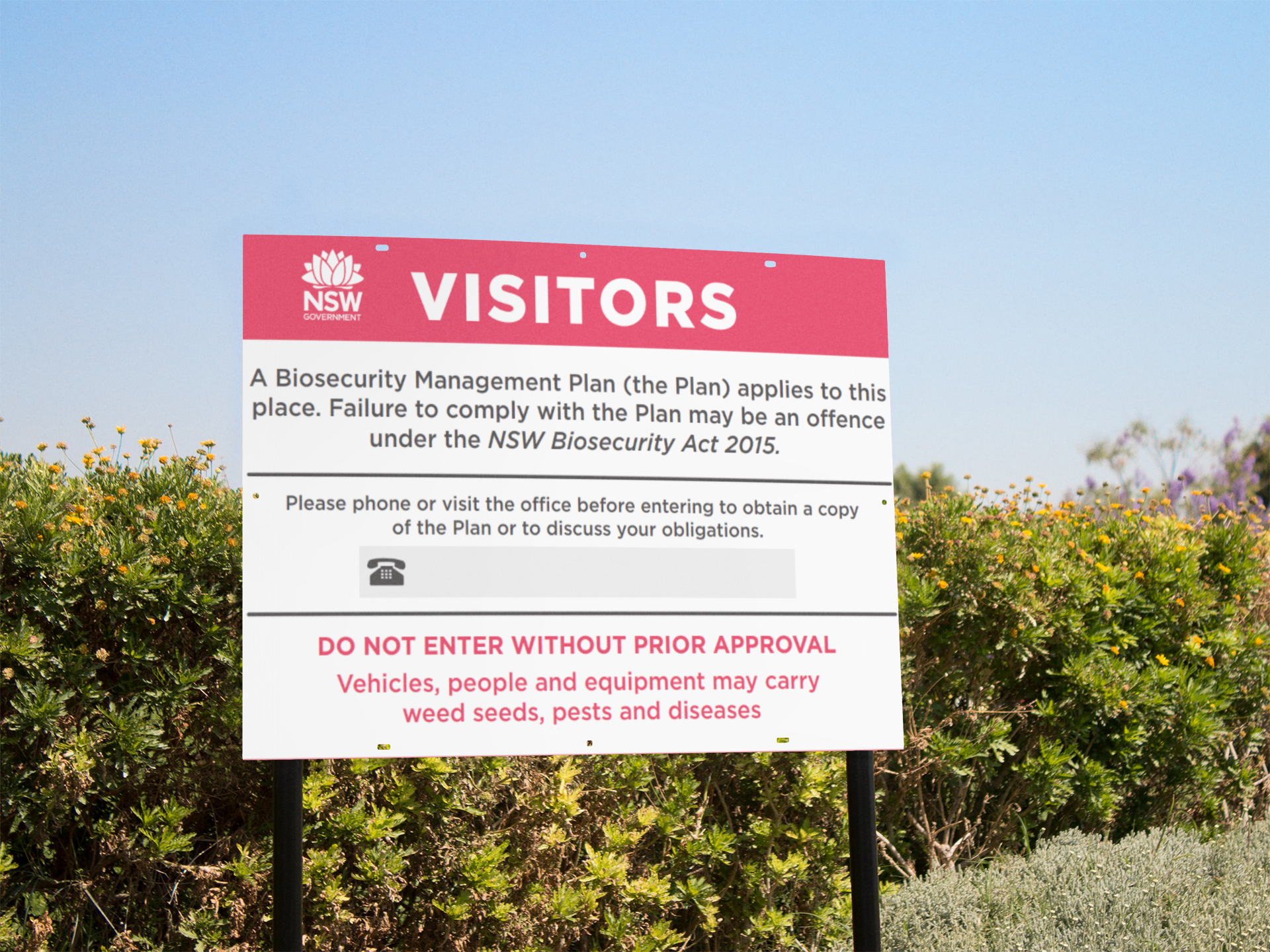
Signs must be displayed at the entrance to the management area to which your plan applies.
Signs must be displayed at the entrance to the management area to which your plan applies.
In what is regarded as a major reform to the State’s Biosecurity Act, a new offence has been created that will see trespassers on farms, creating biosecurity risks, handed an immediate on-the-spot fine of $1,000 and further court-ordered fines of up to $220,000 per person and $440,000 for corporations.
Anyone who enters a designated biosecurity area without permission and without complying with the plan’s requirements, may be subject to the new, harsher penalties.
The new penalties are the first stage of a broader suite of measures being developed to protect NSW farmers’ against both the serious biosecurity risks posed by visitors potentially bringing contaminants and diseases onto properties, as well as well as infringing on producers' right to farm.
To access the new offence, farmers will need to have a BMP in place and appropriate signage. Farmers are encouraged to contact the Department of Primary Industries or their Local Land Services office for more information or assistance in preparing a BMP.
Food Authority sponsored AIFST Convention focuses on future food challenges
The International Convention Centre (ICC), Sydney played host to the 2019 Australian Institute of Food Science & Technology (AIFST) Convention on 1-2 July.
Held annually, this premier food science and safety event brought together food industry professionals and international speakers to share knowledge, insights and learnings about the future of the food industry here and beyond our shores.
This year’s theme was ‘Feeding the Future: challenges and opportunities’, where delegates were encouraged to look into the future and ask some important questions: what will the industry look like? what will consumers be looking for?, and, most importantly, how will food industry professionals meet these consumer needs?
NSW Food Authority staff were amongst the range of diverse and experienced speakers who covered topics including traceability and the importance of food technology and reducing food borne illnesses.
NSW DPI Deputy Director General Biosecurity and Food Safety, Bruce Christie, provided the official opening of the convention and commended the institute for bringing together Australia’s food science and technology professionals to share ideas and opportunities in the food industry. Mr Christie commented on the way the Food Authority collaborates with science, education and industry to improve policy, regulation and food handling processes to reduce the insistence of food borne illness.
By way of demonstrating this collaborative approach, NSW Food Authority’s exhibition stand documented the timeline of the department’s response to last year’s Listeria outbreak in rockmelons and the role that Government and industry played, working together, to improve and safeguard our food industry and consumers.
NSW Food Authority was also proud to be a silver sponsor of the event.
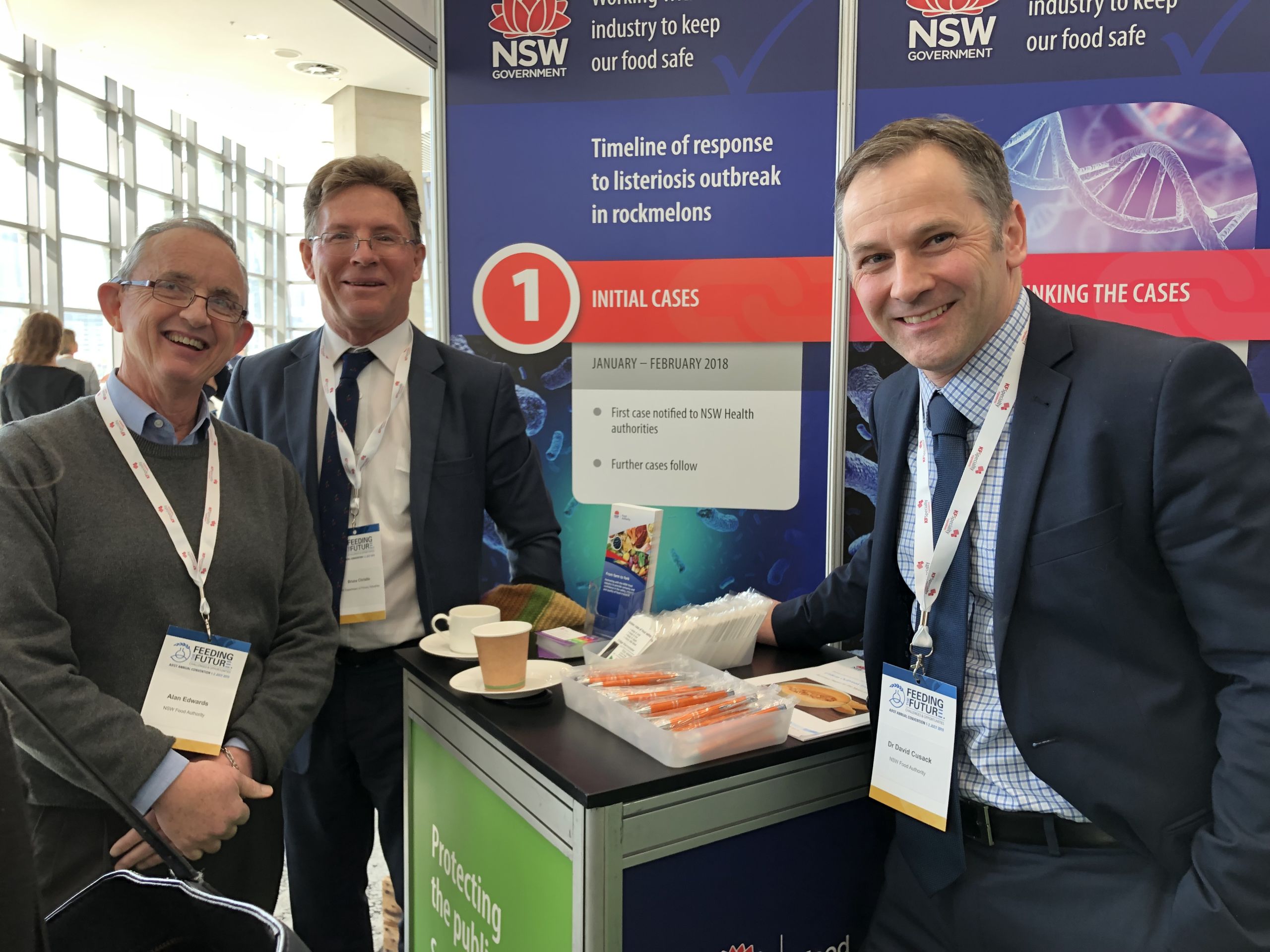
Left to right: Alan Edwards, Dr Bruce Christie and Dr David Cusack
Left to right: Alan Edwards, Dr Bruce Christie and Dr David Cusack
EHA Annual State Conference & NSW Food Authority FRP Workshop
NSW Food Authority hosted its FRP Workshop 2019 and FRP Food Surveillance Champion Awards at the historic Q Station in Manly on 22-23 August.
Themed ‘Turning up the heat on…’, the FRP Workshop was held in conjunction with the Environmental Health Australia (EHA) NSW Annual State Conference from 19-21 August.
The biennual FRP Workshop provides professional development for Environmental Health Officers (EHOs) through education in food regulation and food safety as well as networking opportunities. This year, the workshop attracted approximately 120 EHOs from councils across NSW.
The technical program kicked off on Thursday 22 August with a welcome address by Food Authority CEO, Dr Lisa Szabo, followed by a keynote speech by Bruce Christie, Deputy Director General of Biosecurity & Food Safety at the NSW Department of Primary Industries.
This was followed by a full day of food safety presentations, starting with the “Essentials” workshops in the morning, covering mandatory labelling and foodborne illness investigations. The speed networking sessions in the afternoon looked at science issues raised by EHOs, regulation of special events, council’s experience of the Campylobacter survey, and council case studies.
The FRP Food Surveillance Champion Awards were announced at the joint EHA and FRP dinner on Wednesday 19 August and presented by Paul Braybrooks OAM, Chair of the Food Regulation Partnership, to the following recipients:
- Group-City: Canterbury-Bankstown Council Environmental Health Unit
- Group-Country: Byron Shire Council Environmental Health Services
- Individual-City: Jason Camara, Waverley Council
- Lifetime Service: Jeff Byrom, Bathurst City Council
Feedback received from delegates was very positive and indicated that the FRP Workshop was a huge success.
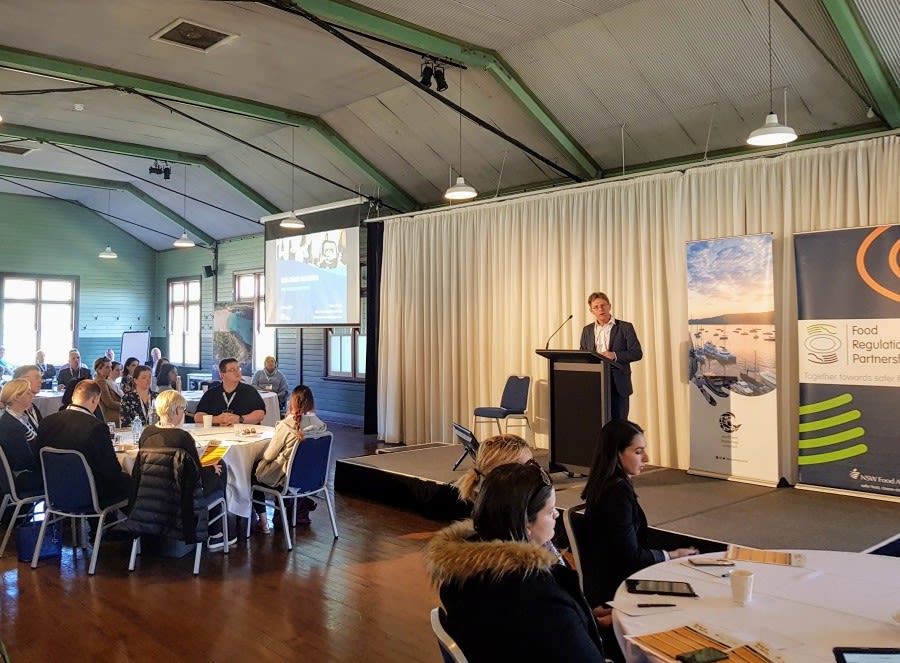
Are you and your family at risk of Q fever infection?
NSW Health is warning people to get vaccinated and to take other steps to prevent Q fever, as drought and high winds may increase the risk of the disease spreading.
Q fever is a serious illness which often appears like a severe flu, with high fevers and chills, sweating, severe headaches, muscle and joint pains and extreme fatigue. Chronic lethargy can remain for months after treatment. In severe cases, Q fever can cause hepatitis or pneumonia.
Q fever is a bacterial infection which is carried by cattle, sheep and goats, as well as native and some domesticated animals. It is caused by inhaling dust particles contaminated by infected animal secretions.
People who are in direct contact with farm animals, some domestic pets and wildlife are at risk of contracting Q fever. This particularly includes workers in occupations such as livestock and dairy farmers, farm workers, shearers, wool classers, stockyard workers and veterinary staff. Family members of workers are also at risk as the bacteria can be carried on farm tools or work clothes and brought into the family home.
People who live close to farming areas may be at risk of infection through indirect contact with infected animals, such as by breathing in contaminated dust.
Vaccination is the best protection against Q fever
The Q fever vaccine (Q-VAX®) is the best way to prevent infection. Vaccination is highly recommended for people who work or intend to work in high-risk occupations. Vaccination is also recommended for everyone aged 15 years and over who has the potential to be exposed to Q fever at home or locations they plan to visit. People should also take the following steps to protect against Q fever:
- washing hands and arms thoroughly in soapy water after any contact with animals
- wearing a properly fitting P2 mask when handling or disposing of animal products or when mowing or gardening in areas with livestock or native animal droppings
- wearing protective clothing and thick gloves when working with high-risk animals or animal products
- removing and washing dirty clothing, coveralls, boots and equipment in outdoor wash areas to prevent exposing other household residents
- washing animal urine, faeces, blood and other body fluids from equipment and surfaces and properly disposing of animal tissues including birth by-products.
For information regarding testing and vaccination against Q Fever, visit www.qfever.org or visit the NSW Health website.
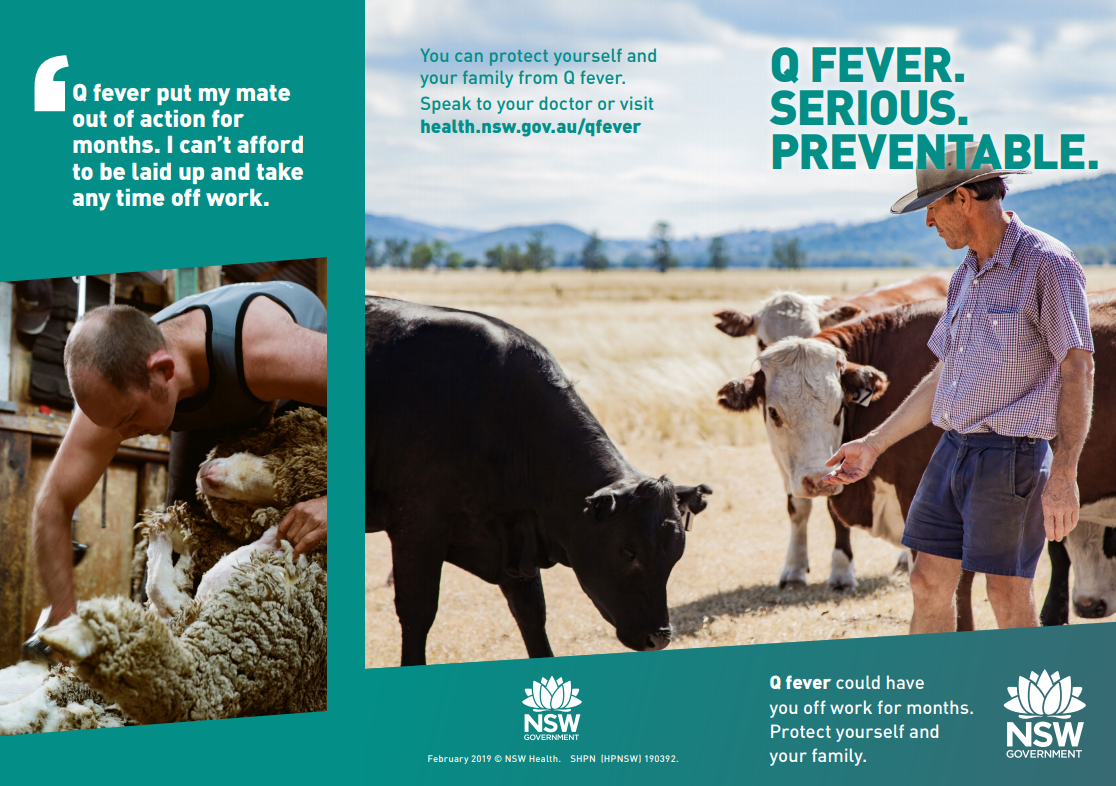
For information regarding testing and vaccination against Q Fever, visit www.qfever.org or visit the NSW Health website.
For information regarding testing and vaccination against Q Fever, visit www.qfever.org or visit the NSW Health website.
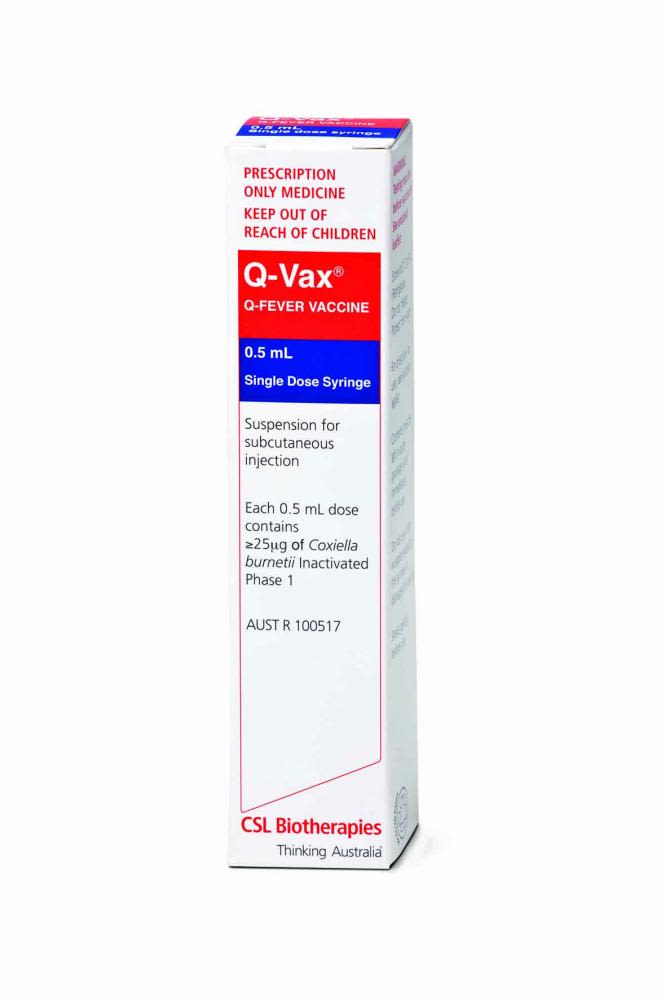
Q-VAX® Q-fever vaccine.
Q-VAX® Q-fever vaccine.
26th Asia Pacific Food Safety Conference (formerly known as the Australian HACCP Conference)
The Annual APAC Food Safety Conference held in Sydney on 21-22 August, provided an invaluable opportunity for industry to engage with key stakeholders and discuss recent food safety issues.
The event was well attended by retailers, food manufacturers, research organisations and Australian Government agencies.
Presentations from international and local food experts explored food safety risks, covering a range of topics from food safety within the horticultural industry, building integrity into the supply chain, sustainability and food waste, ethics, deliberate tampering of food and combating food fraud.
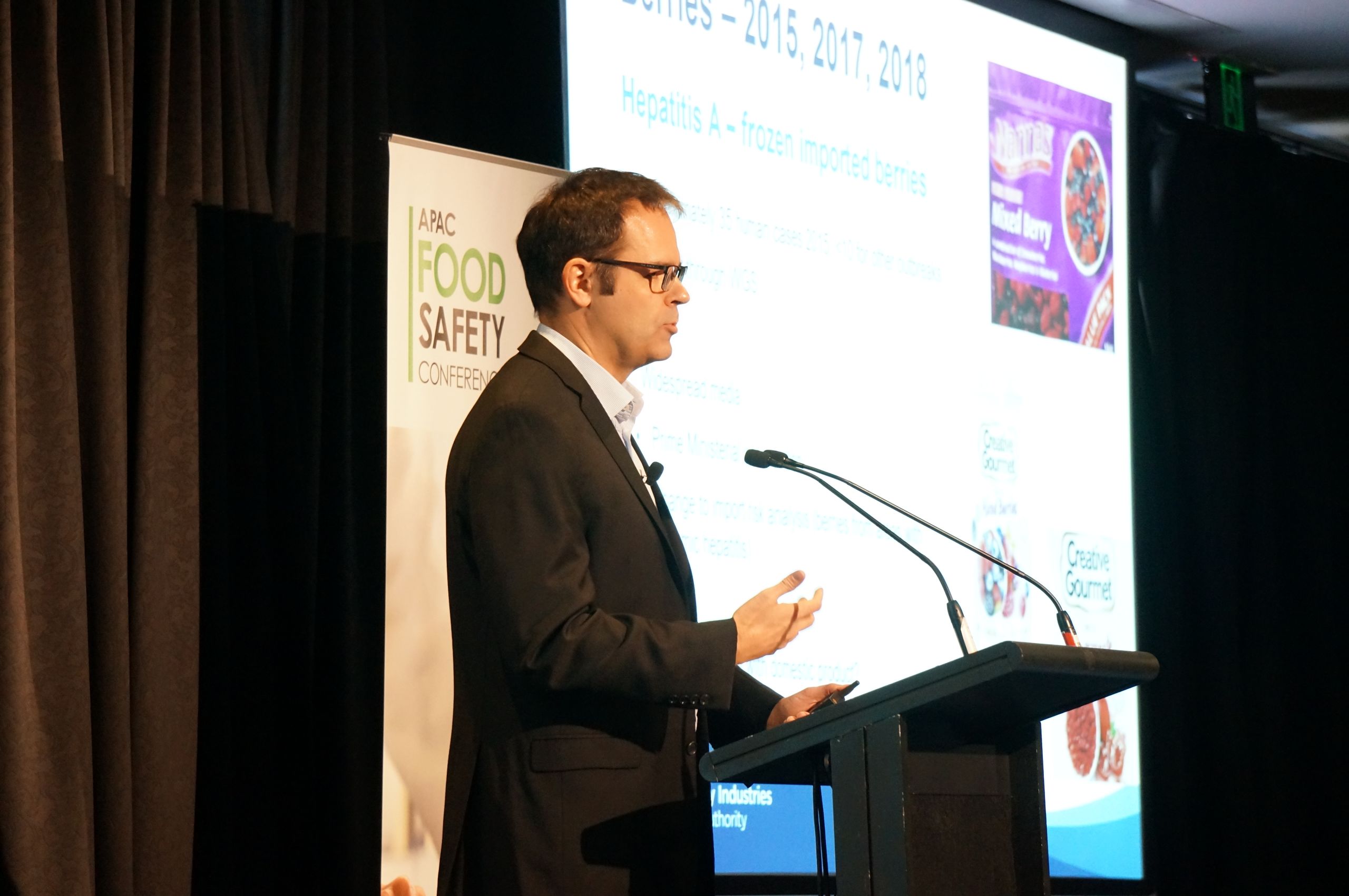
Dr Craig Shadbolt, Manager of Food Incident Response, DPI Biosecurity and Food Safety, presenting Recent Outbreaks with High Risk Horticulture in Australia.
Dr Craig Shadbolt, Manager of Food Incident Response, DPI Biosecurity and Food Safety, presenting Recent Outbreaks with High Risk Horticulture in Australia.
NSW DPI delivered two presentations at the conference. Craig Shadbolt (BFS Compliance & Integrity Systems) provided an overview of Recent Outbreaks with High Risk Horticulture in Australia and Ian Beer (BFS Compliance & Integrity Systems) gave a presentation on Food Safety Enforcement and Compliance Trends in NSW and what business can do to minimise risk through due diligence.
Third Party Auditor Conference 28-29 August 2019
The NSW Department of Primary Industries Food Authority (Food Authority) seeks to continually improve how it engages with Third Party Auditors (TPA) to keep them updated with developments and learnings in sectors TPA are eligible to audit within. These sectors include Vulnerable Persons (VP), Dairy Farms, Plant Products, Seafood Processing, and Cold Stores.
To facilitate learnings in this area, the Food Authority schedules an annual two day TPA conference where topics of interest and importance including audit performance, regulatory changes, advances in technology, and scientific knowledge are discussed. Furthermore, this forum provides an opportunity for TPA to discuss issues they experience in their roles with other auditors and the Food Authority.
Third Party Auditors are an important auditing resource for the NSW Food Authority contributing to most of the VP and Dairy Industry licensee audits conducted. Due to the importance of the VP and Dairy sectors, the number of TPA the Food Authority authorises, and the complexity of the food safety systems TPA encounter, it is important to provide a forum where TPA and the Food Authority can discuss industry and sector issues, provide a platform for ongoing professional development of TPA, and receive presentations from agency technical units and industry representatives.
Now in its fifth year, and continuing to evolve into a truly professional development forum, the TPA conference, held on 28-29 August 2019, provided an opportunity to discuss industry developments, emerging trends in auditing, auditing performance, and other food safety specific topics related to the daily duties of TPA through case studies in Salmonella.
Topics which included behavioural insights of auditee and auditor during the audit process, Influenza related learnings in the VP sector, and water quality testing updates all enabled informative and constructive discussions.
The Conference was once again very well received by the TPA with participation both in session and online through a live webinar and attended by over 25 TPA.

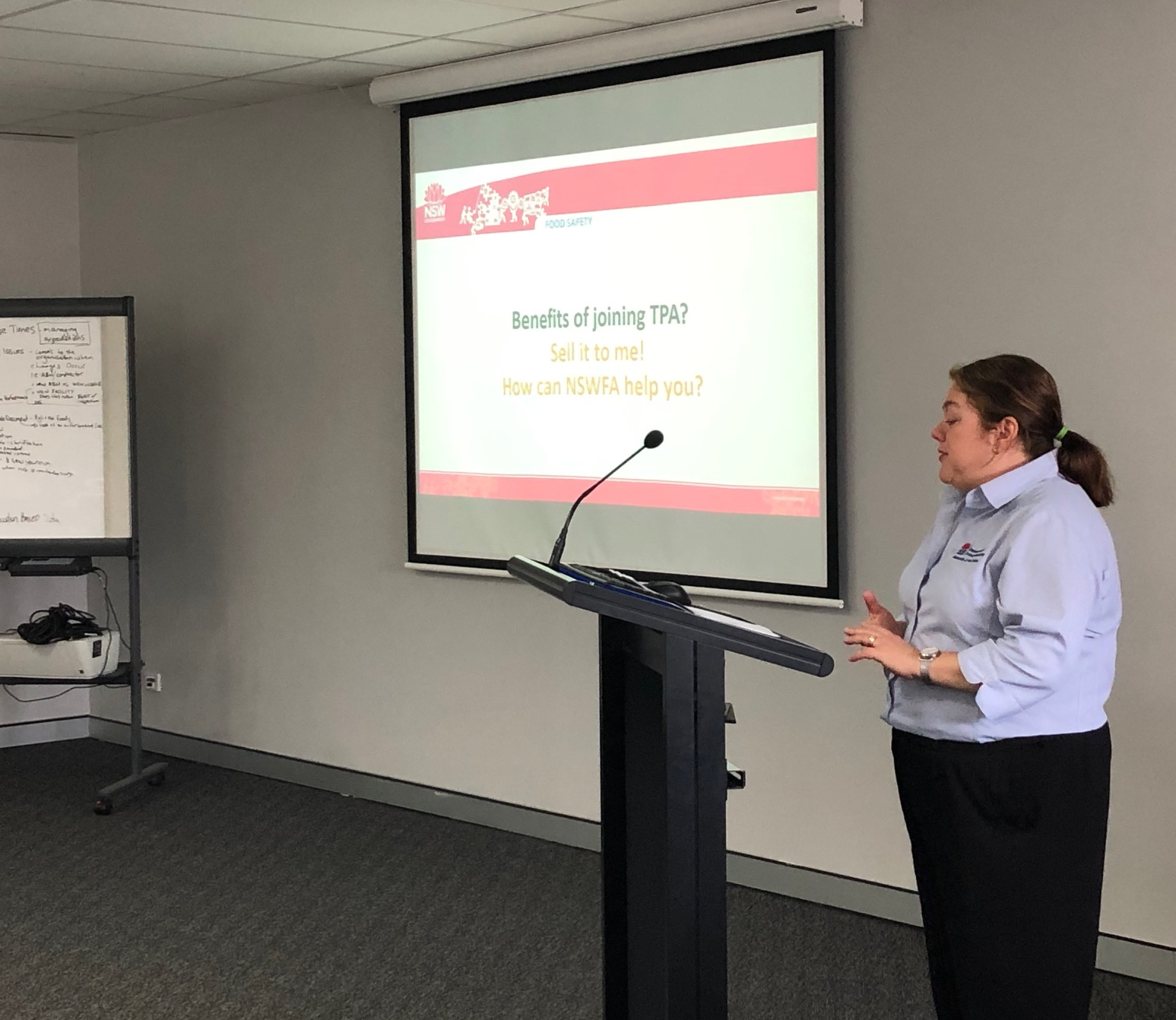
Wollongbar celebrates 125 years as a leading centre for primary industries research
This year the NSW Department of Primary Industries’ (DPI) Wollongbar Primary Industries Institute celebrates 125 years as a leading centre for primary industries research.
Over 1000 people attended an Open Day held at the institute on Saturday 24 August, with guided tours, hands-on activities, historical displays, and information on the latest research discoveries to mark the occasion.
Minister for Agriculture and Western NSW, Adam Marshall opened the celebrations.
“Over the past 125 years, Wollongbar has serviced the community in the agricultural sector incredibly well, leading research in a number of key areas, particularly the cattle tick program and commercial recreational fishing,” Mr Marshall said.
Mr Marshall also broke new ground by turning the first sod of the $1.5million glasshouses being constructed at Wollongbar to enhance the research efforts of the blueberry and macadamia nut industries.
Institute Director Mark Hickey said that when Wollongbar became the site of the second experimental farm in New South Wales in 1894, its purpose was to test fruit crops, grasses and dairying suited to the subtropical climate. But its core goal to support the states farming industries hasn’t changed.
“Wollongbar is now a modern Institute located on more than 100 hectares of prime agricultural land, part of a network of DPI research facilities across the state,” Mr Hickey said.
Institute Director, Mark Hickey talks about the history and services of the Wollongbar Primary Industries Institute.
“Today the Institute continues to support primary industries with approximately 100 staff working in the field and in laboratories.
“We support profitable and sustainable agriculture, horticulture, fisheries and rural communities through research, compliance, education and industry engagement.”
Displays and activities at the Open Day gave the local community a fantastic insight into the research that occurs at the Institute including horticulture, beef cattle operations, the cattle tick program, a fisheries activity trailer, soils research, water testing, drones, rainforest walks, timber plantations, entomology, biosecurity and invasive species.
Throughout August, as part of the anniversary celebrations, staff at the Institute also held over 11 masterclasses to highlight some of the research undertaken and share knowledge with the community. Topics included Agricultural Land Use Planning, Integrated Pest Management and Disaster Preparedness, amongst others.
An Anniversary Dinner attended by over 80 ex-staff members, was also held on the evening prior to the Open Day.

This large two-storeyed wooden house was built in 1901 to accommodate agricultural students at Wollongbar.
This large two-storeyed wooden house was built in 1901 to accommodate agricultural students at Wollongbar.

Wollongbar is now a modern Institute located on more than 100 hectares of prime agricultural land, part of a network of DPI research facilities across the state.
Wollongbar is now a modern Institute located on more than 100 hectares of prime agricultural land, part of a network of DPI research facilities across the state.
RETAIL
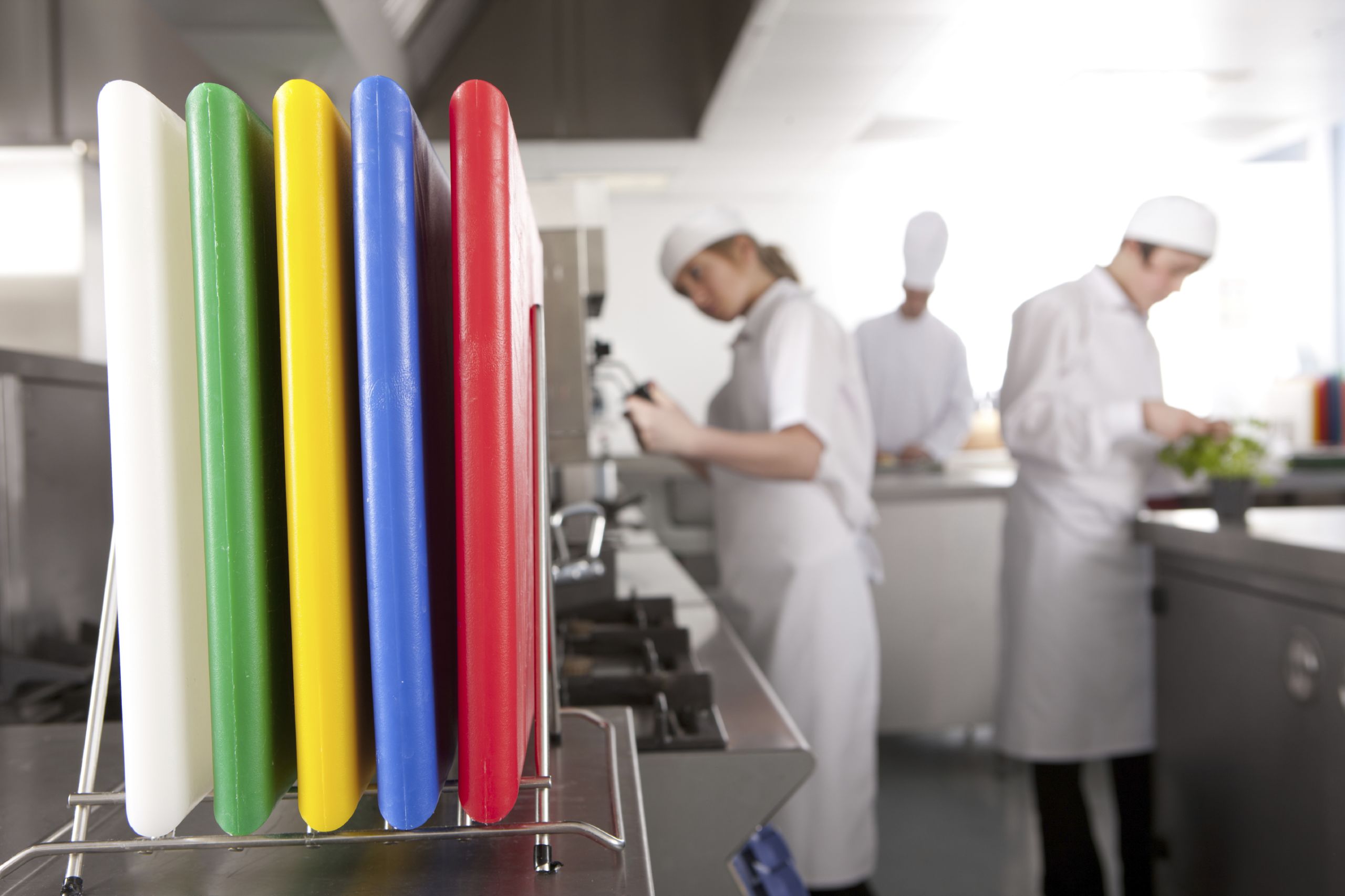
Byron Shire Council shines at Retail and Food Service Information Session
Despite the drizzling rain, Byron Shire Council were warm hosts at the Food Authority’s latest Retail and Food Service Information Session on 26 June. The event in Byron Bay was attended by 50 food business from around the Byron Shire – a large area of fertile agricultural land on the northern NSW coast between Byron Bay, Tweed Heads and Lismore.
Event attendees had the opportunity to learn about NSW food safety regulation and the partnership between local councils and NSW Food Authority, as well as various food safety topics specifically relevant to the retail food setting.
Byron Shire Council discussed their successful Scores on Doors program, latest food safety initiatives, and food waste and sustainable plastics programs. Other presentations covered food labelling, cleaning and sanitising, causes of foodborne illness, the local food industry and retail-specific programs such as Food Safety Supervisor and Scores on Doors.
NSW Food Authority Dr Lisa Szabo, CEO of the NSW Food Authority, said the session was one of three events held each year across the state delivered by the Food Authority and co-hosted by local councils.
“Food safety is the top priority of the Food Authority and having direct contact like this is an effective way of providing information, education and dialogue between retail food businesses, council Environmental Health Officers, who are responsible for the inspections of food retail premises, and the Food Authority,” Dr Szabo said.
Feedback from the event was extremely positive. Attendees particularly enjoyed the mandatory labelling and health claims presentation, as well as the regular Q&A session at the end of the day’s presentations.
The Q&A session is an open discussion where attendees are invited to ask questions about specific food safety issues relevant to them. Attendees said there was great benefit from being able to raise food safety questions, queries or concerns directly with the experts – and get immediate answers!
For more information, download the Byron Bay presentation slides.
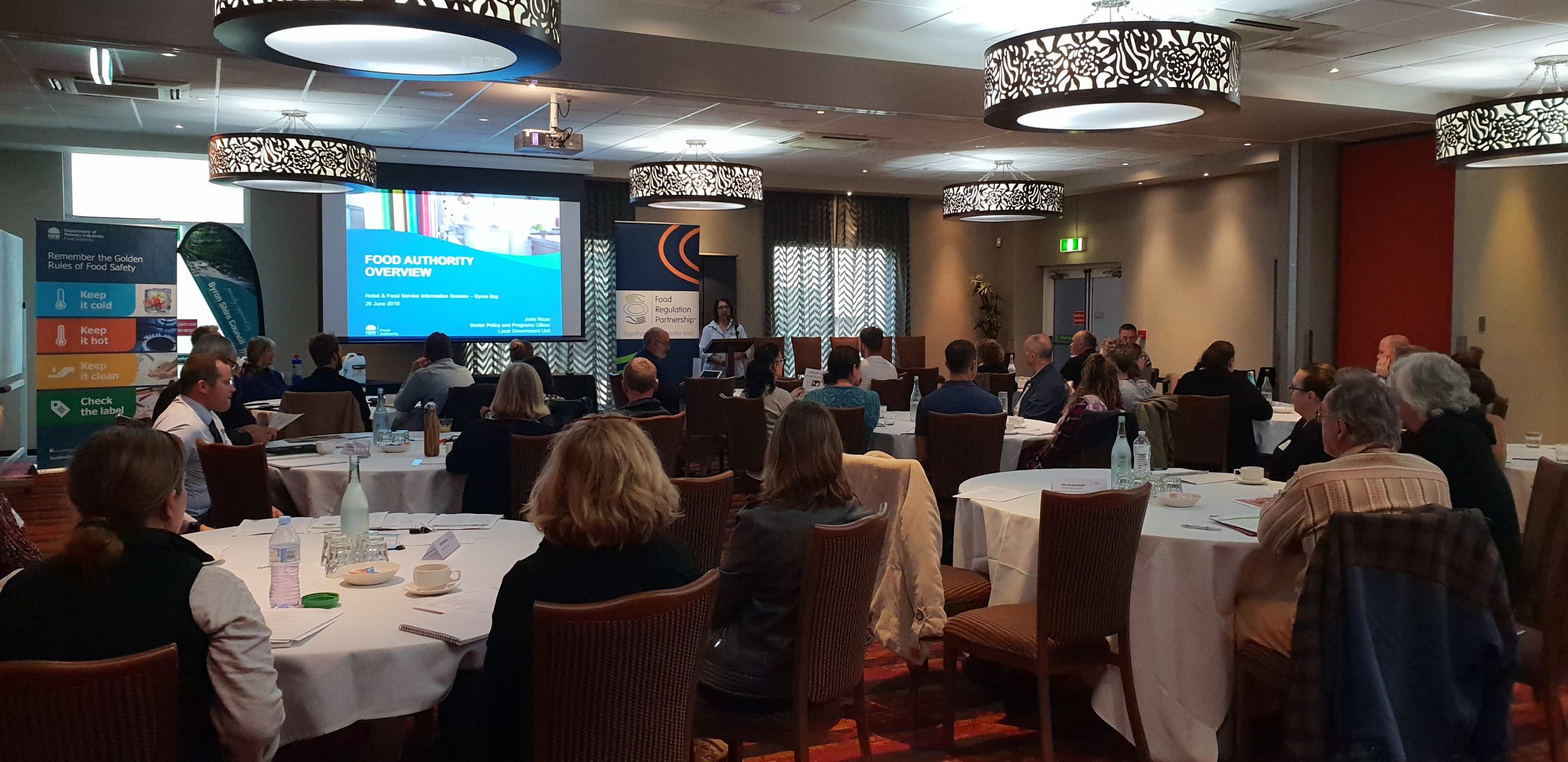
Participants attending the Byron Shire Council shines at Retail and Food Service Information Session
Participants attending the Byron Shire Council shines at Retail and Food Service Information Session
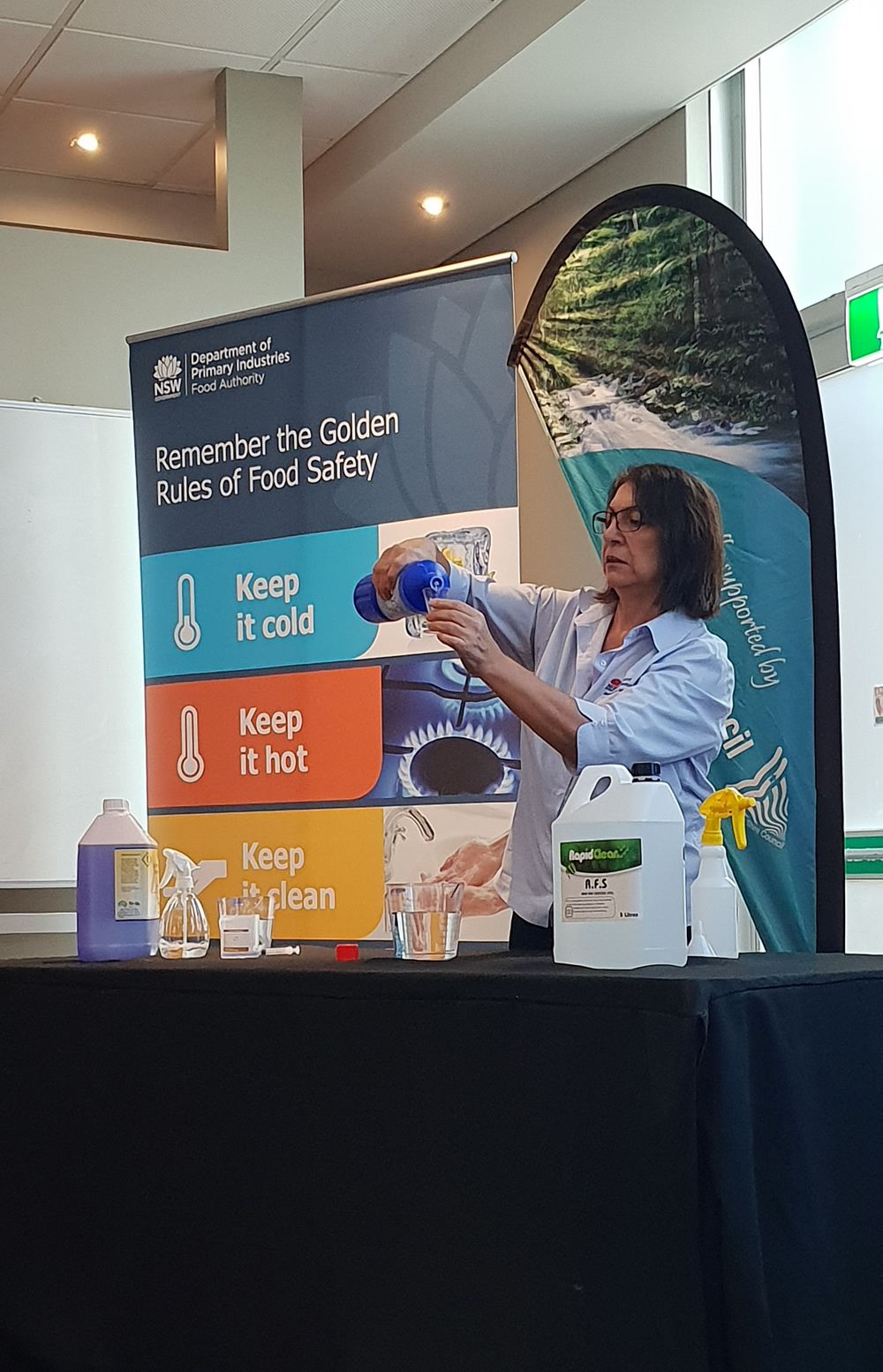
Josie Rizzo, Local Government Unit, NSW Food Authority, demonstrating retail sanitisation techniques.
Josie Rizzo, Local Government Unit, NSW Food Authority, demonstrating retail sanitisation techniques.

From left to right: Dr David Cusack, Andrew Davies, Enzo Picerni (Byron Shire Council), Paul Braybrooks (Chair, Food Regulation Forum), Josie Rizzo, Sarah Northam, Judd Owen and Ella Bickerstaff (Byron Shire Council)
From left to right: Dr David Cusack, Andrew Davies, Enzo Picerni (Byron Shire Council), Paul Braybrooks (Chair, Food Regulation Forum), Josie Rizzo, Sarah Northam, Judd Owen and Ella Bickerstaff (Byron Shire Council)
Authorised Officer (Local Government) Food Surveillance Training 2019
Environmental Health Officers (EHOs) from councils all around NSW descended on the Food Authority last month to undertake six days of food safety training sessions and gain the latest skills and knowledge in food surveillance activities.
The Authorised Officer (Local Government) Food Surveillance Training sessions were conducted over two weeks from 9-11 July and 16-18 July and attended by 30 authorised officers that carry out, or are learning to carry out, food inspections at the retail level.
To appoint an authorised officer, NSW councils must be satisfied that prospective officers have the qualifications or work experience to carry out their duties as stipulated in the NSW Food Act 2003.
Councils must therefore make sure that anyone working in food surveillance gets adequate training in the inspection and regulation of retail food outlets – a condition of the council’s appointment as an enforcement agency.
The authorised officer training course helps local councils provide a clear pathway for new officers, trainees or anyone wanting refresher training to gain the appropriate skills and knowledge to conduct food surveillance activities on behalf of their council.
Specifically, the course aims to:
- educate and train council staff responsible for carrying out food inspection duties under the NSW Food Act 2003, in accordance with the Food Regulation Partnership Protocols and Advisory Guidelines, and NSW Food Authority policies and guidelines
- promote consistency between councils
- provide a workforce continuity strategy to cover skills shortages in the EHO field.
Participants were required to do an online pre-training course to make sure they understood the roles and responsibilities of an enforcement agency under the NSW Food Act 2003. They were also required to accompany another authorised officer on food inspections prior to the start of training.
An assessment on the pre-requisite work was undertaken in the first week and participants attended a practical demonstration about the use of sanitisers in the second week.
We hope the authorised officers enjoyed the training sessions and we look forward to seeing them use their newly-acquired skills and knowledge when carrying out retail food inspections in the future.
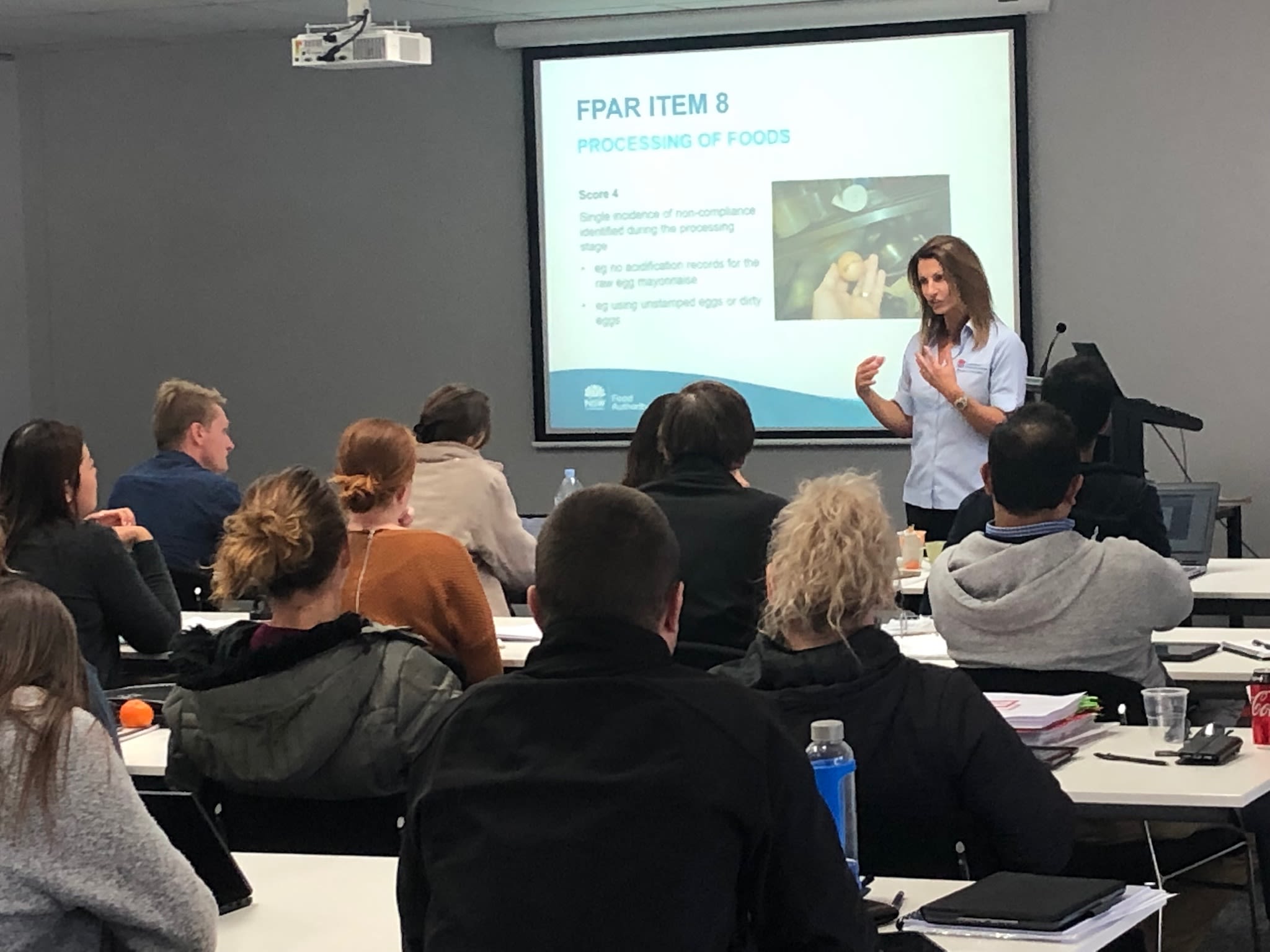
MEAT
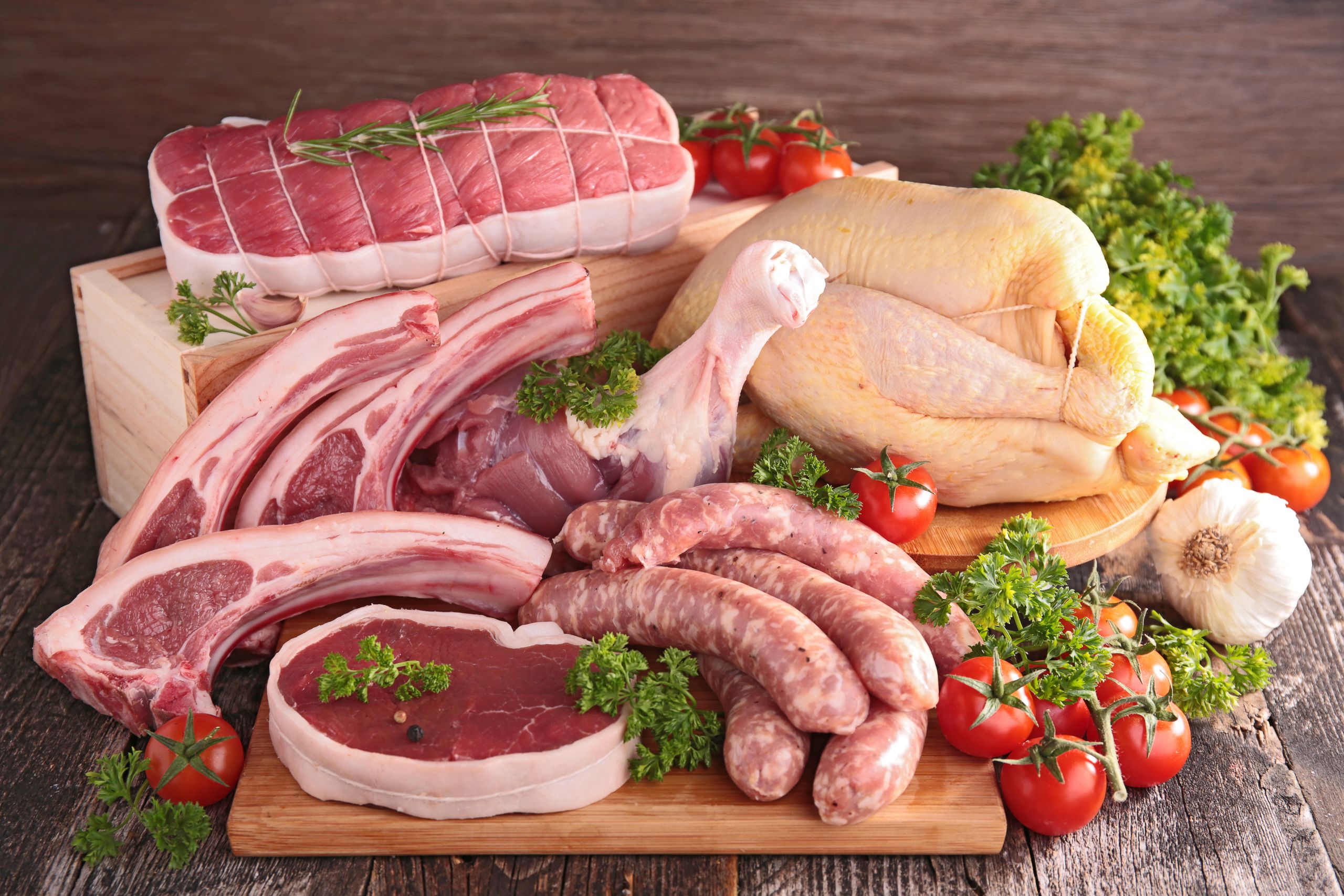
Inspections and audits
From April 2019 to June 2019, the NSW Food Authority conducted 192 inspections and 393 audits of licensed meat businesses. This industry sector has maintained a high compliance rate with 96% of businesses recording an acceptable result during the 2018/19 reporting period.
The below table shows yearly comparable data for compliance and audit activity in the meat sector between reporting years 2017/18 and 2018/19.
| Reporting period | 2017/18 | 2018/19 |
|---|---|---|
| Total audits | 1986 | 1692 |
| Total inspections | 1824 | 788 |
| Compliance rate | 95% | 96% |
Meat Industry Consultative Committee, 10 July 2019
Topics discussed at the last Meat Industry Consultative Committee, held in Sydney on 10 July, included:
Food safety compliance report
- The meeting heard that between 1 July 2018 to 30 June 2019, 1639 audits and 720 inspections were conducted. Of these, there were 48 failed audits and 55 failed inspections.
- Compliance was up 1% to 96%
- 158 enforcement actions were undertaken (inc. 3 warning letters, 128 improvement notices, 26 penalty notices)
- One prosecution of a butchery for offences relating to breaching the Food Standards Code by adding preservative (SO2) to minced meat.
- A new feature of the compliance report is the inclusion of investigation and enforcement action data from the National Livestock Identification System (NLIS). 95 investigations were conducted over the financial year reporting period with 29 warning letters being issued for non-compliance.
- Overall, the Department is pleased with the high compliance rate for the meat industry sector over this period.
Disruption from animal activists
An ongoing issue of concern raised by members continues to be disruptive activities by animal activists. This is happening across all sectors of the industry with vigils outside plants, drone surveillance, multiple break-ins and theft of animals, and privacy breaches.
Product names
Members also discussed the growing market for substitute plant-based products and naming conventions (use of the terms ‘meat’, ‘chicken’ and ‘milk’) and potential for consumers to be misled by product names. Members are also keeping a watching brief on the development of synthetic products that are compositionally and genetically equivalent to natural products e.g. laboratory grown meat.
Cold Store Food Safety Program
An information paper regarding a new document that would satisfy both regulatory and business food safety program requirements for cold food stores (storing both meat and non-meat products) was noted.
It was advised that the format will make it easier for businesses to comply with cold store food safety requirements as all relevant information will be contained within the one document which can then be easily presented during their next audit.
The NSW Cold Store Food Safety Program and diary is available to purchase at a cost of $55.00 and is also available to download free of charge.
National reforms to the Property Identification Code (PIC) project update
An update of the PIC project Property Identification Reforms:enhancing agricultural traceability was given to members. The reforms are aimed at developing nationally consistent arrangements for the allocation and use of property identifiers for the animal and plant production sectors. This work arose from the review of the Intergovernmental Agreement on Biosecurity (IGAB) led by panel Chair Dr Craik in 2017.
Australian agriculture ministers responded to the independent panel’s final IGAB report, Priorities for Australia’s biosecurity system in late 2018 and made a specific commitment to examine property identification codes nationally in animal and plant products industries; to develop a set of consistent business rules by the end of 2019 and to harmonise legislation to give effect to national PICs across animal and plant products industries by the end of 2022.
The presentation also outlined other current traceability reviews including the National traceability project, SAFEMEAT reforms to Australia’s livestock traceability and the Food Exports Review.
View a full summary of meeting outcomes.
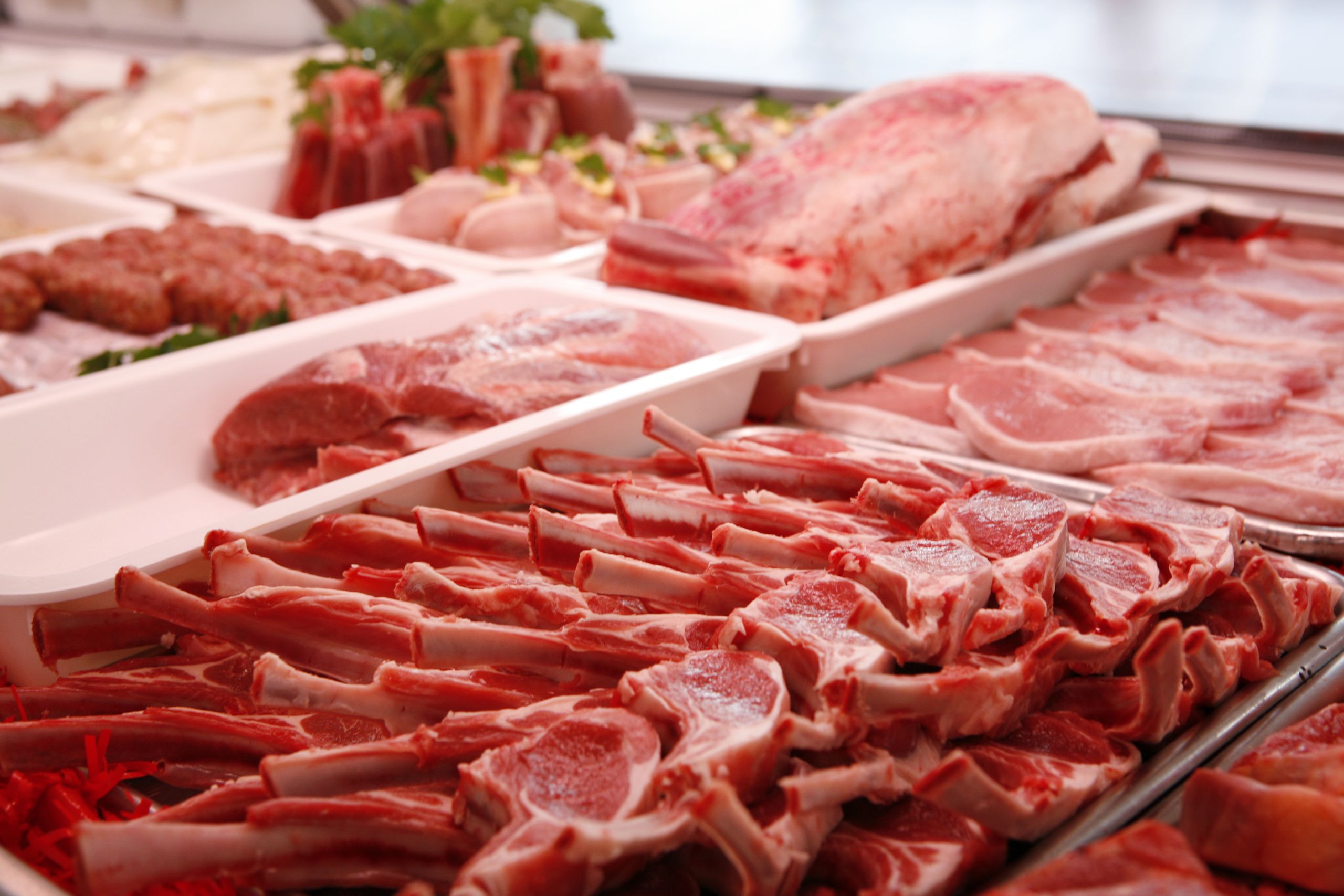
UCFM Approval Process - Ensure your approvals are current
Licensed businesses that hold a licence to produce UCFM (uncooked comminuted fermented meat) products must continually review their production processes to ensure they are operating in compliance with their approvals.
Licensees must be aware that any change to their approved process, including adding new ingredients, changing product sizes or processing methods, requires an additional assessment and approval to ensure that the new products are safe to consume.
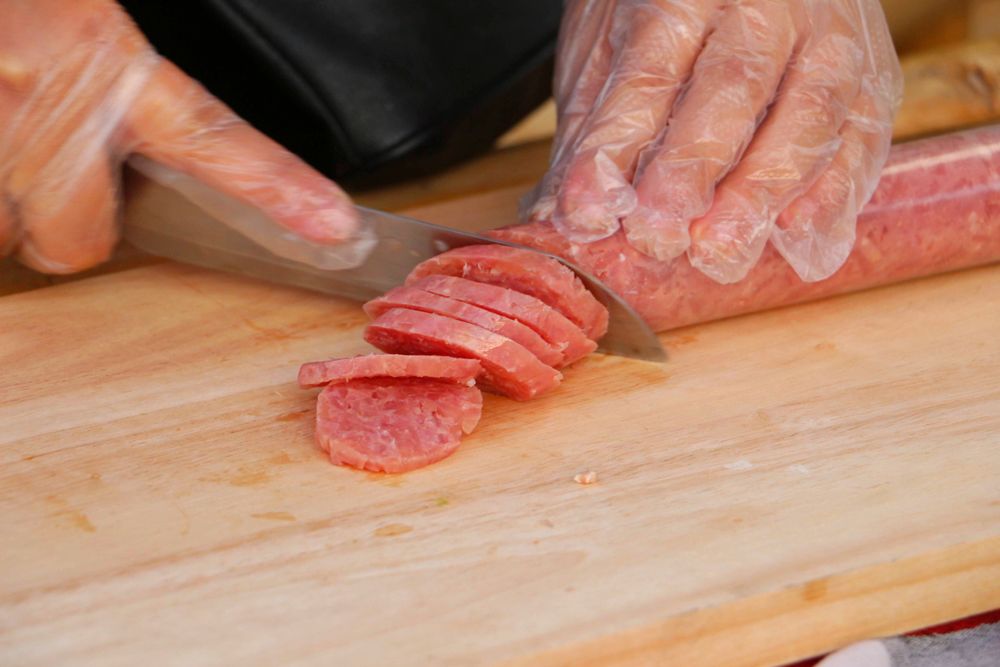
Fermented pork sausage
Fermented pork sausage
Licensees producing UCFM products are reminded to check their approved processes and ensure they are operating in compliance with these requirements, as the production of UCFM products that haven't been assessed and approved is not permitted and may result in enforcement actions.
For more information, please click here or call the Helpline on 1300 552 406.
SEAFOOD
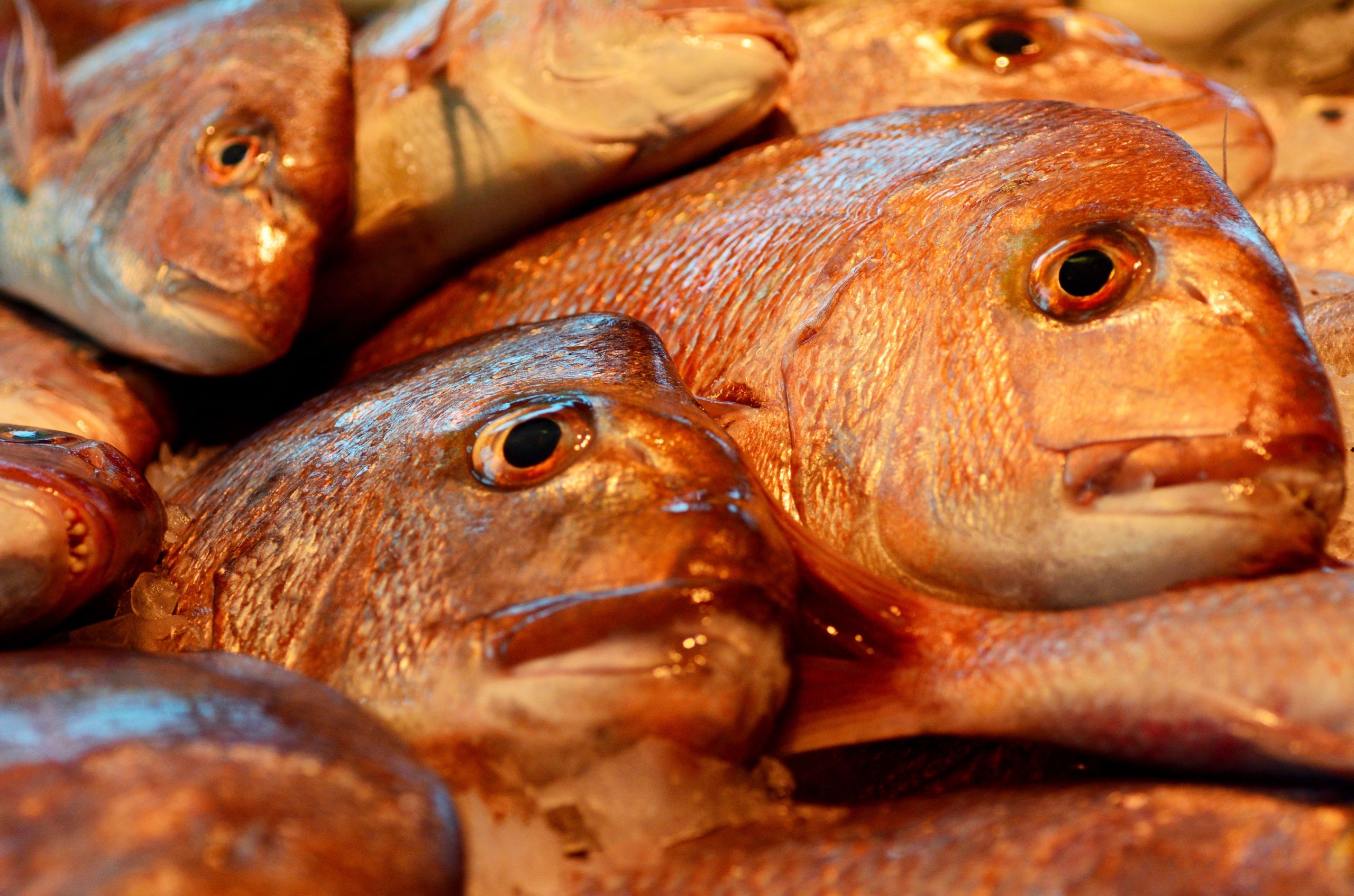
Inspections and audits
From April 2019 to June 2019, the Food Authority conducted 94 inspections and 49 audits of licensed seafood businesses. This industry sector has recorded a compliance rate of 96%.
The main areas where critical defects have been raised at audit continue to be with process control, analytical testing, and food safety program monitoring. There have been no consecutive audit failures and the clear majority of defects raised have been rectified immediately which demonstrates that effective corrective actions are being implemented by businesses.
The table below shows yearly comparable data for compliance and audit activity in the seafood sector between reporting years 2017/18 and 2018/19.
| Reporting period | 2017/18 | 2018/19 |
|---|---|---|
| Total audits | 340 | 268 |
| Total inspections | 968 | 724 |
| Compliance rate | 95% | 96% |
Seafood Industry Forum, 15 May
Topics discussed at the latest NSW Seafood Industry Forum, held in Sydney on 15 May, included:
Food safety compliance report
- Members heard that between 1 July 2018 to 31 December 2018, 146 audits and 105 inspections were conducted. Of these, there were 5 failed audits and 3 failed inspections.
- Compliance was up 1% to 97%
- It was noted that 66 inspections were conducted under the fishing vessel inspection program and a high compliance rate of 98% recorded an acceptable inspection rate for the period
- Enforcement actions during the period under review included two improvement notices and one warning letter
- The Biosecurity & Food Safety Compliance team is very satisfied with the high compliance rate recorded for the seafood industry sector
Industry updates
Members provided updates on key and emerging issues in their respective industry sectors. Issues raised included:
Listeria monocytogenes limits in ready-to-eat (RTE) food
Members noted that the Food Authority’s Food Safety Schemes Manual outlines the mandatory testing that is required to be done by licensed businesses - for seafood this relates to open oysters, packaged oysters, cooked and smoked seafood.
The Appendices in the Manual reference the Food Standards Code and the microbiological limits for Listeria monocytogenes. The limits were revised to acknowledge that RTE food which supports the growth of L. monocytogenes increases the risk that the food will contribute to listeriosis.
White Spot Disease – Queensland situation update
An update paper was tabled noting that Queensland resumed production of farmed prawns in south east Queensland in mid-2018, and no reports of mortality due to WSD occurred through to harvest of those prawn crops in early 2019. White spot syndrome virus (WSSV) was not detected in Queensland in late 2018 in either farmed prawns or wild crustacean surveillance, and early 2019 surveillance results are being finalised.
The NSW government has now also completed the second round of testing for the national surveillance for WSSV (as part of proof of freedom activity), with all prawns tested returning negative results for the virus. NSW will continue to extend its advisory campaign to key stakeholders as the Queensland response to white spot continues.
Abalone national surveillance
An update paper was tabled noting the national coordinated active surveillance for abalone pathogens in wild and farmed abalone. This forms part of a key initiative of the Australian Government’s 2015 Agricultural Competitiveness White Paper to facilitate improved early detection of pest and diseases and generate information to support trade/market access.
NSW DPI has been involved through a national working group to ensure that the surveillance plan and sampling protocols are scientifically robust and fit for purpose. Sampling of abalone has been undertaken across six sites in NSW (Disaster Bay, Eden, Merimbula, Bermagui, Ulladulla and Gerringong). Test results are not expected until 2020.
Carbon monoxide (CO) in fish
A paper was tabled regarding the use of CO in fish. Standard 1.3.3 – Processing Aids in the Food Standards Code clarifies that carbon monoxide must not be used in the processing of fish where its use results in a change to or fixes the colour of the flesh of the fish. The variation also clarifies that this prohibition does not extend to carbon monoxide that is naturally occurring or naturally present in smoke being used to process fish as a food.
Members noted that the compliance remit for CO in imported fish products sits with DA; currently there are no seafood processors licensed in NSW to undertake a smoking treatment technique; NSW DPI has not received any complaints in recent years on domestic or imported products regarding this matter.
PFAS Update
A paper was tabled noting updates since the Forum’s October 2018 meeting. In particular, FSANZ (December 2018) updated its website information to comment upon a recent update by the European Food Safety Authority (EFSA); updates for the Richmond site were published by the NSW EPA in November 2018 and April 2019, including information for the Hawkesbury River and updated information was published in December 2018 for Jervis Bay and the Shoalhaven River.
The NSW Food Authority participates in the PFAS Taskforce and the NSW Expert Panel for PFAS and will continue to inform the Seafood Industry Forum of developments (standing item). Information about PFAS sites in NSW, fish sampling and any fishing advisories can be found at the NSW EPA website.
The next meeting of the NSW Seafood Industry Forum will be held on Wednesday 2 October 2019.
View a full summary of meeting outcomes.
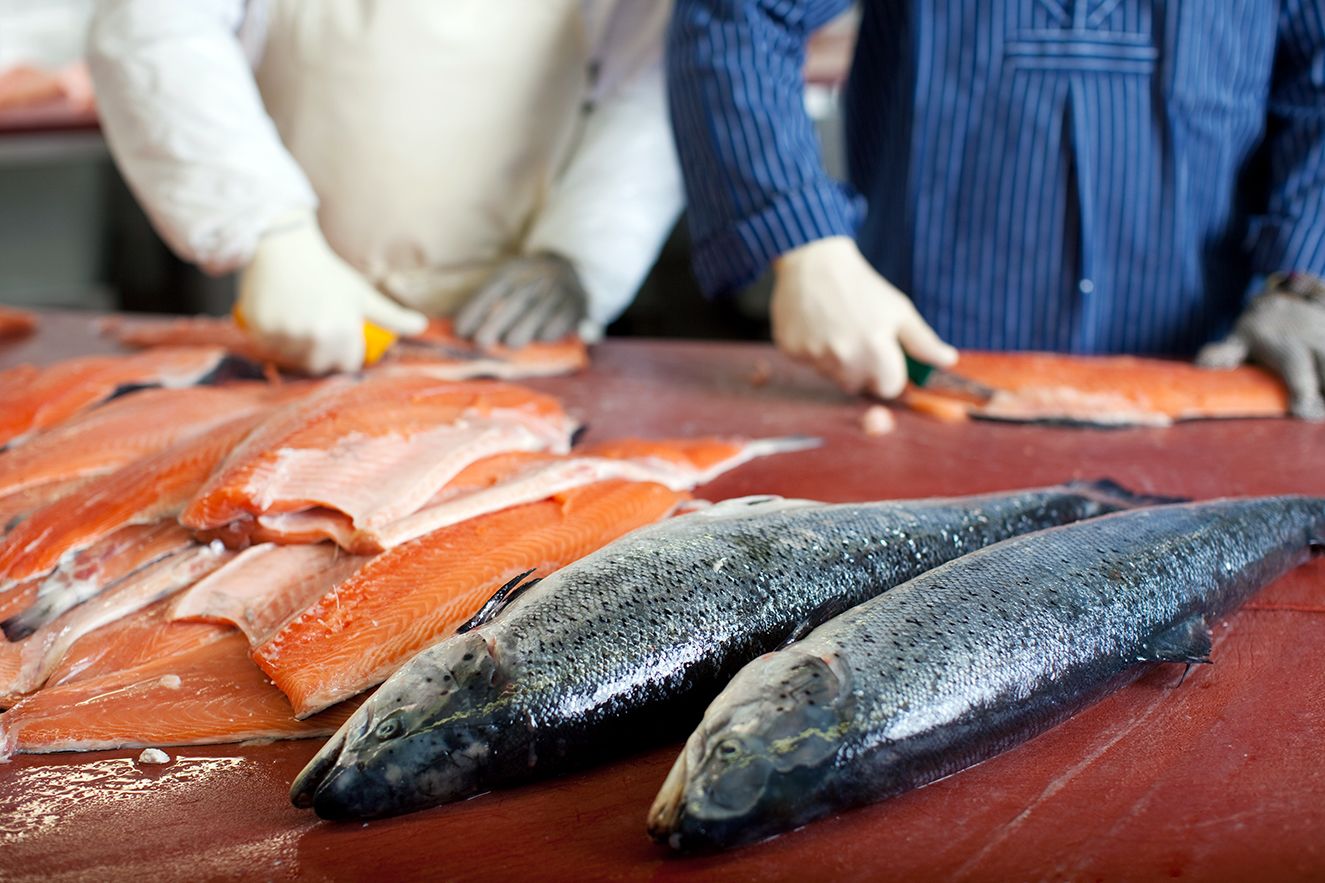
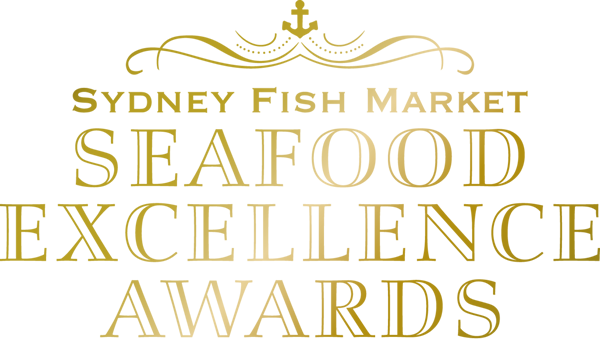
Seafood Excellence Awards
NSW DPI was proud to be the Gold Sponsor and attend the Sydney Fish Market (SFM) Seafood Excellence Awards held at the Australian National Maritime Museum in Sydney on Thursday 25 July 2019.
The SFM Seafood Excellence Awards are held biennially and honour the industry’s top achievers across ten award categories.
This years Best Supplier (NSW) Award, presented by Dr Lisa Szabo, CEO of the NSW Food Authority, was won by Coffs Harbour Fishermen’s Co‑op.
The Best Supplier (NSW) Award, which has been sponsored by the Food Authority since 2011, is presented to a NSW seafood primary producer/ supplier that has demonstrated excellence in the sustainable production of quality seafood through innovation in fishing or aquaculture practices, and has contributed substantially towards a positive public profile for the seafood industry.
The event provided a great opportunity to celebrate the achievements of the industry which employs more than 4,000 people and generates approximately half a billion dollars in economic activity in NSW each year.
It was also a chance to highlight DPI’s important work in the commercial fishers sector, growing investment opportunities and fostering new initiatives.
Congratulations also go to Dr Matt Taylor who received a ‘Highly Commended’ acknowledgement for the 2019 Research, Development & Extension Award.
Matt has worked for DPI since 2011 and was recognised for his work quantifying linkages between estuarine habitats and fisheries productivity and value.
DPI will continue to work with our partners to build a successful and vibrant NSW seafood industry.
For more information about the 2019 awards winners, visit https://seafoodexcellenceawards.com.au/
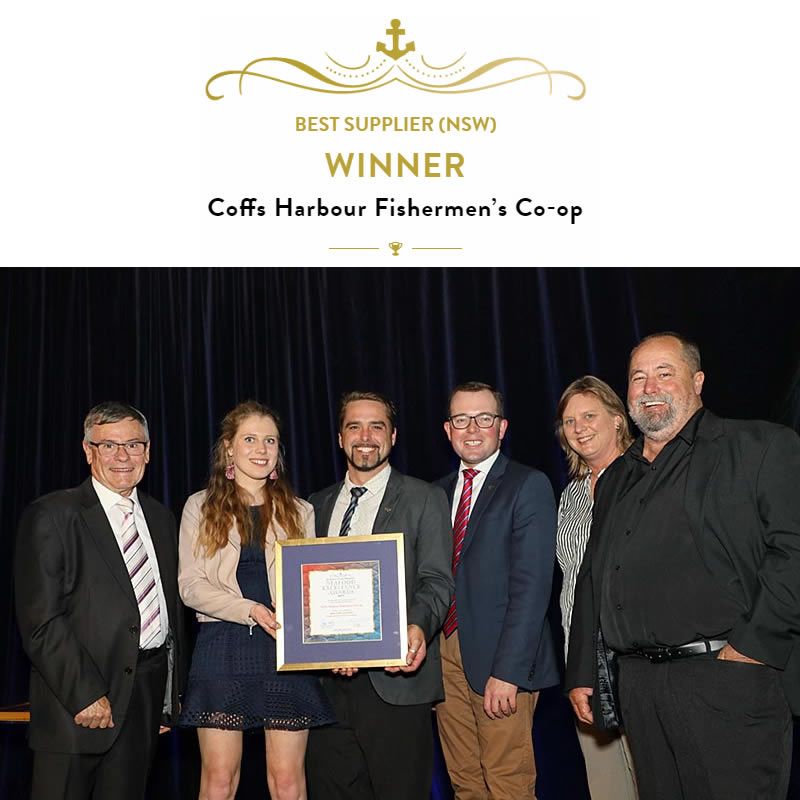
The Hon. Adam Marshall, Minister for Agriculture and Western New South Wales (3rd from right) and Dr Lisa Szabo, CEO, NSW Food Authority (2nd from right) presenting the Best Supplier award to Coffs Harbour Fisherman's Co-op.
The Hon. Adam Marshall, Minister for Agriculture and Western New South Wales (3rd from right) and Dr Lisa Szabo, CEO, NSW Food Authority (2nd from right) presenting the Best Supplier award to Coffs Harbour Fisherman's Co-op.
NSW Shellfish Committee, August 2018
Topics discussed at the latest NSW Shellfish Committee, held in Sydney on 14 August, included:
Industry updates
Members provided updates on key and emerging issues in their respective industry sectors. Issues raised included:
Oyster Industry Clean Up Week
A national oyster industry clean up week has been scheduled for 17 February 2020 where the focus is cleaning up estuaries of oyster farming materials that have escaped lease areas. The date was chosen to back onto Clean Up Australia Day to work in with Councils for collection and disposal of oyster and community waste. Numerous states are onboard and 17 oyster farming estuaries in NSW have signed up for the week.
Public Liability for Shellfish Businesses
A recent recall of oysters through a supermarket chain has left a business with a $17,000 cost recovery charge and highlighted a concern regarding a lack of insurance covering this type of event. It was suggested that shellfish businesses discuss with their chosen insurer whether or not they are covered for third party costs in the event of a food recall. The direct cost of a full consumer level recall through a large supermarket chain can exceed $100,000, so industry members are urged to discuss food recall coverage with their insurer.
Management of Oyster Reef
Oyster reefs, both natural and man-made have been identified as a key habitat for many marine species. Acknowledging this key habitat many agencies are involved in oyster reef creation and restoration. In creating and restoring oyster reefs, both dead oyster shell and live oysters are used. NSW Shellfish Committee is finalising a set of guidelines for where this shell material and live oysters can be sourced.
It is proposed that removal of shell and oysters from the following areas only are permitted:
- Post and rail scrape off
- Collapsed oyster cultivation, lightly encrusted
Removal of shell and oysters from the following areas are not permitted
- Oyster encrusted natural reef or rock
- Oyster encrusted traditional rock cultivation or shell bed (dredge beds)
- Collapsed oyster cultivation, heavily encrusted established reef
Low Interest Innovation Fund
The committee noted that low interest loans are available through the NSW Government Seafood Innovation Fund administered by the NSW Rural Assistance Authority.
The next meeting of the NSW Shellfish Committee will be held on Wednesday 6 November 2019.

DAIRY
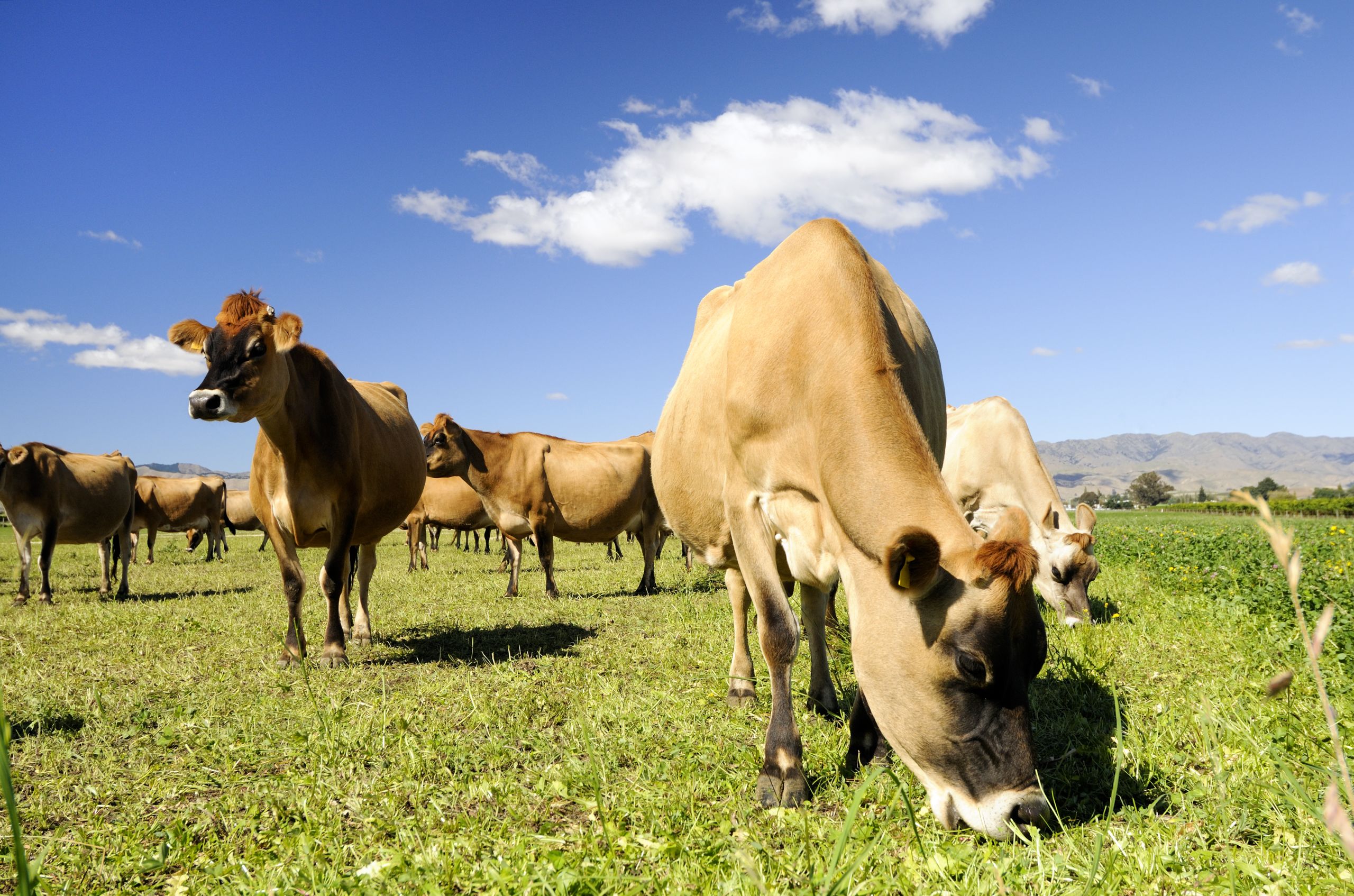
Inspections and audits
From April 2019 to June 2019, the Food Authority conducted 15 inspections and 138 audits of licensed dairy businesses. This industry sector has recorded a compliance rate of 94%. There were no serious enforcement actions taken against licensed dairy business during this period.
The below table shows yearly comparable data for compliance and audit activity in the dairy sector between reporting years 2017/18 and 2018/19.
| Reporting period | 2017/18 | 2018/19 |
|---|---|---|
| Total audits | 605 | 611 |
| Total inspections | 108 | 87 |
| Compliance rate | 96% | 94% |
Dairy Industry Consultative Committee, 12 June 2019
Topics discussed at the latest Dairy Industry Consultative Committee, held in Sydney on 12 June included:
Food safety compliance report
- The meeting heard that between 1 July 2018 to 31 December 2018, 285 audits and 42 inspections were conducted. Of these, there were five failed audits and three failed inspections.
- Compliance was up 1% to 97.5% from the previous six-month period
- The low level of enforcement activity during the period is reflective of a highly compliant industry.
- Construction and maintenance were the main CAR issued across the dairy processing sector. This indicates that auditors are identifying issues requiring improvement in areas such as equipment and facility maintenance.
- There were a small number of antibiotic notifications and pathogen notifications received during the period. The Biosecurity & Food Safety Compliance team is very satisfied with the high compliance rate recorded for the dairy industry sector.
Botulism in Cattle
The Food Authority referred to the Biosecurity newsletter (Winter 2019 Edition – Issue 3) which published an article Botulism in Cattle.
Drought
Current drought conditions continue to put increased pressure on industry in terms of milk supply. Members reported that the quality of feed being fed to cattle is also presenting challenges on milk quality.
Feed contamination issues are also introducing weeds to properties and pose a health risk to animals possibly already stressed under drought conditions. Donated feed may not always come with a fodder declaration making traceback or product difficult.
Farm Biosecurity
The committee heard about biosecurity concerns with people and service providers coming onto farms. The NSW DPI is currently preparing a draft protocol which will outline how farmers can safeguard their properties and meet their biosecurity obligations when people are coming and going onto their farms.
Disruption from animal activists
A common issue of concern raised by members is the increasing level of disruptive activities by animal activists. Members also noted that this is happening across other industries with vigils outside meat processing plants, drone surveillance, multiple break-ins and theft of animals, and privacy breaches.
This type of activity has ramifications for biosecurity as well as food safety with unauthorised entry into these facilities being a potential vector for the introduction of diseases. Members discussed the requirement to display a physical address on food products and traceability requirements. Members were advised that the NSW DPI has a project targeted for this year to look into these issues and will work together with industry on this.
Raw Milk Products Regulation
The committee received an update on the enforcement of the Food Amendment (Raw Milk Products) Regulation 2018 requirements. There have been no applications received to date for businesses wishing to set up a raw milk product supply, storage or distribution business.
The purpose of the regulation is to minimise the risk of unpasteurised cows milk being consumed when labelled or marketed as not being for human consumption. It arose from incidents of food poisoning from numerous bath milk products including the death of a child in Victoria in 2014.
Proper temperature storage
Industry members talked about an increasing trend for retail outlets such as cafes to purchase their milk supplies from supermarkets rather than refrigerated milk delivery vendors. Members were concerned that the milk was not being stored appropriately during transport from the supermarket to the cafe. The Food Authority agreed to contact NSW local councils through its Food Regulation Partnership highlighting the safety messages around temperature control of potentially hazardous foods, including milk and milk products, to share with retail food businesses during inspections.
Information for farmers on veterinary chemicals
An information paper was tabled regarding the resources that are available to dairy industry members regarding veterinary chemicals and drugs. Members noted that the Australian Pesticides and Veterinary Medicines Authority (APVMA) is the national body who oversees the registration of veterinary and agricultural chemicals. Companies apply to the APVMA for registration however the APVMA is not charged with communicating with individual industries on new products or label changes.
The responsibility for making industry aware of changes is shared between the companies who produce the products, the resellers, industry bodies and the state and national governments, where appropriate.
Due to the frequent label changes and new products getting registered and the large number of products that the APVMA deals with makes it an onerous task to communicate with individual producers on those changes and it is usually resellers and veterinarians who would advise the dairy producers of label changes and new products .
The paper outlined several resources available to the dairy industry for researching products. Importantly, the paper noted that dairy producers risk severe fines and damage to export markets for milk and meat if using an unregistered product in dairy animals and that veterinarians with an ongoing relationship with the individual herd are best placed to speak to about veterinary drugs or chemicals.
The date for the next meeting of the NSW Dairy Industry Consultative Committee is Tuesday 10 September 2019.
View a full summary of meeting outcomes.
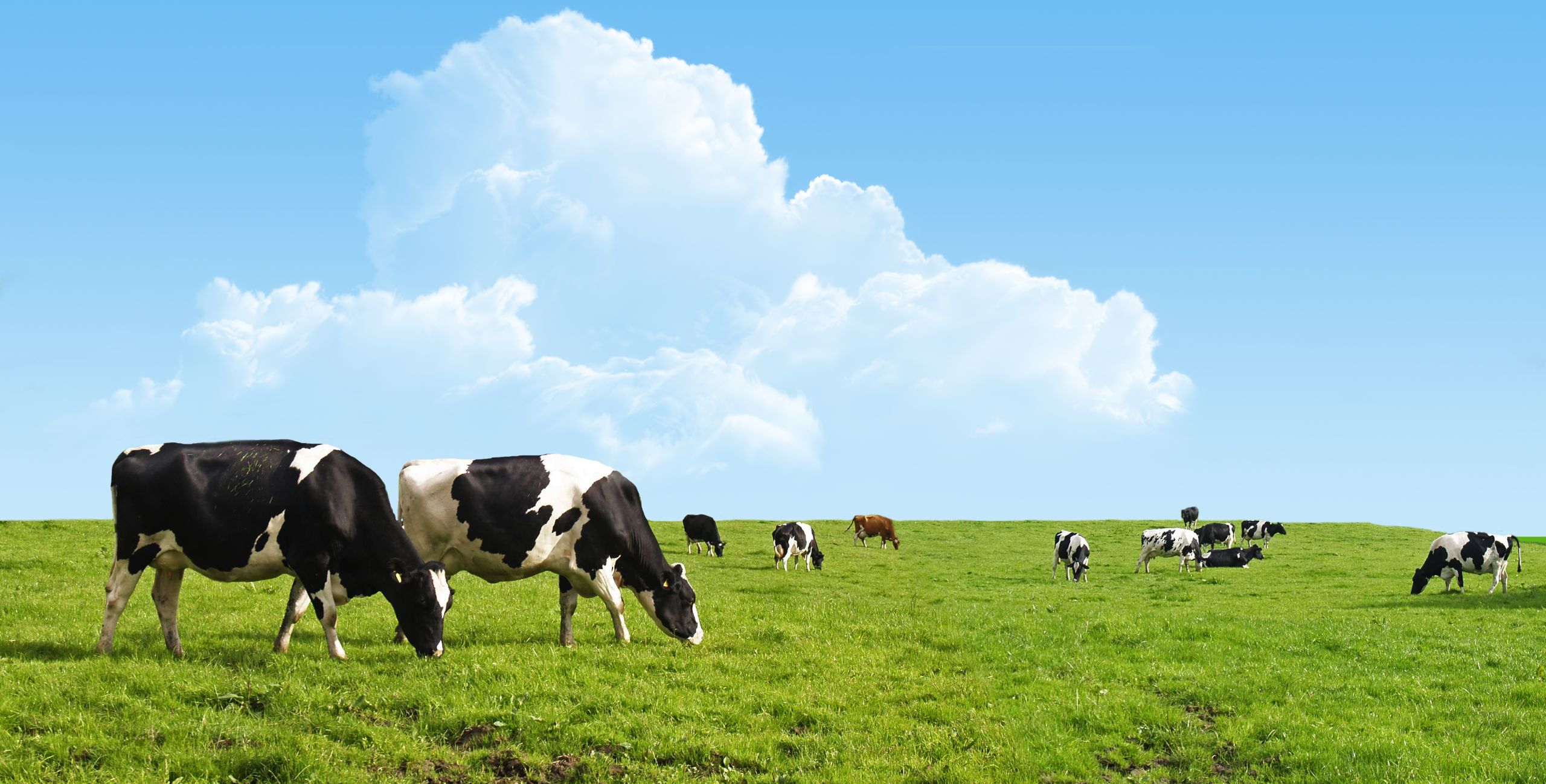
Botulism in cattle
In early 2018, cattle owned by a NSW dairy producer were heavily impacted by botulism. As a result of this incident, NSW DPI is continuing to educate the community on the devastating effects that this usually fatal disease can cause.
Botulism is caused by the botulinum toxin produced by the bacterium Clostridium botulinum. The toxin is generally produced outside the animal and ingested in supplementary feed.
Outbreaks are most likely to occur in intensively fed beef and dairy cattle:
Forage botulism - the feed is contaminated with botulinum toxin that has been produced by the botulism bacteria growing in rotting vegetable material in the stored feed.
Carrion botulism - bacteria grown in the carcasses of animals eg. rodents, reptiles or birds with massive quantities of the toxin produced. Carrion incorporated with silage or hay then acts as a source of toxin. Large outbreaks have occurred when mixing wagons were used in preparing dairy rations and the toxin was evenly distributed throughout the mix.
Botulism can also occur when chicken litter containing chicken and rodent carcasses has been used as a fertiliser on pastures and not incorporated into the soil properly.
Typical signs of the disease are hindlimb weakness that can progress to paralysis, collapse and death. The higher the toxin dose, the more rapid the onset disease.
The risk of botulism can be reduced by only feeding high quality hay and silage. As the risk can never totally be eliminated, producers such as dairy farmers should consider vaccinating for botulism.
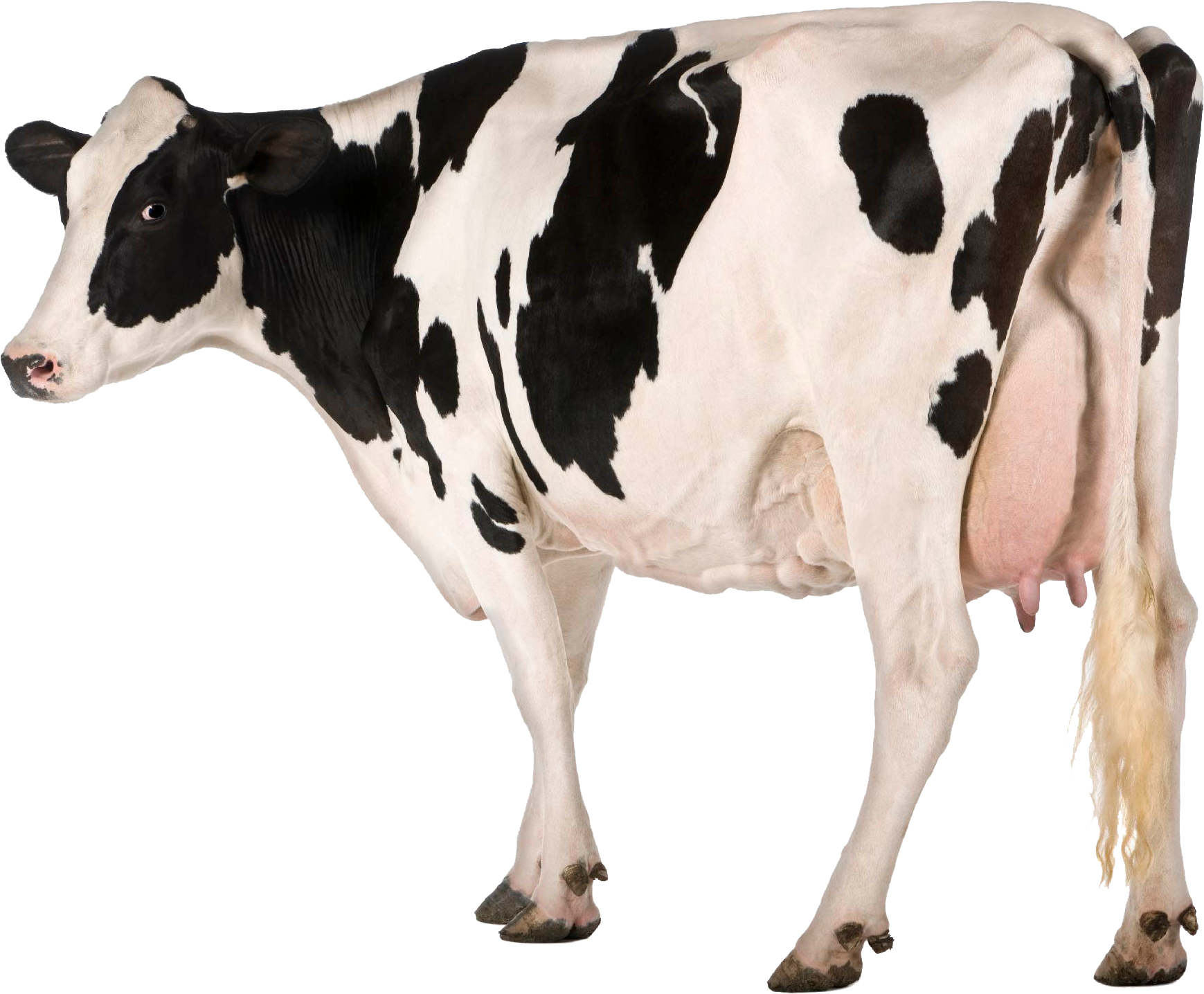
Botulism is caused by the botulinum toxin produced by the bacterium Clostridium botulinum. The toxin is generally produced outside the animal and ingested in supplementary feed.
Botulism is caused by the botulinum toxin produced by the bacterium Clostridium botulinum. The toxin is generally produced outside the animal and ingested in supplementary feed.

Botulism is caused by the botulinum toxin produced by the bacterium Clostridium botulinum. The toxin is generally produced outside the animal and ingested in supplementary feed.
Botulism is caused by the botulinum toxin produced by the bacterium Clostridium botulinum. The toxin is generally produced outside the animal and ingested in supplementary feed.
EGGS
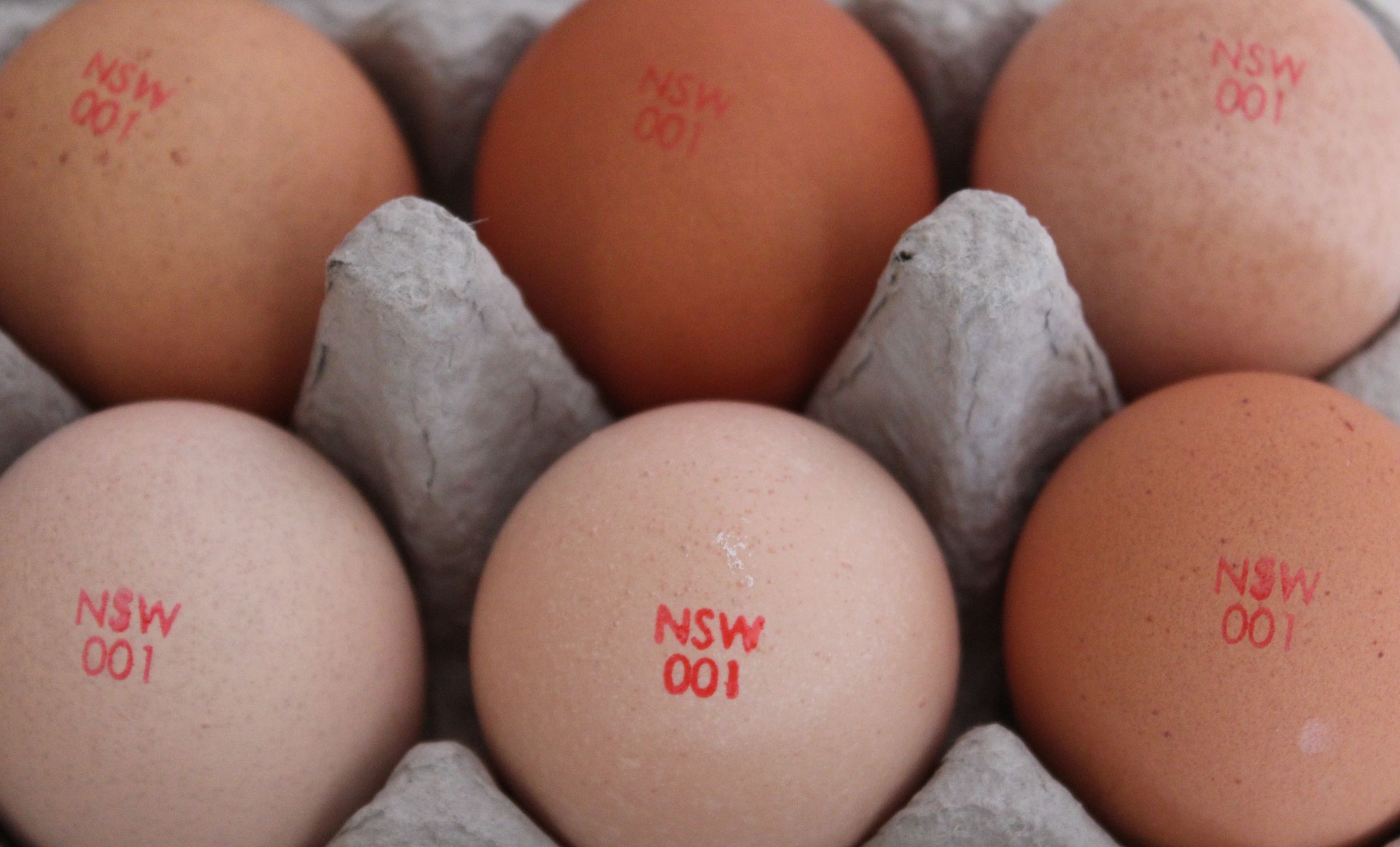
Inspections and audits
From April 2019 to June 2019, the Food Authority conducted 125 inspections and 30 audits of licensed egg businesses. This industry sector has recorded a compliance rate of 88% for the 2018/19 reporting period.
Following a steady increase in the number of cases of Salmonella Enteritidis (SE) in humans in NSW since May 2018, NSW DPI and other government agencies worked collaboratively to identify the source of this Salmonella. Steps were taken to minimise consumer exposure to SE risks from these infected premises including movement restrictions, farm depopulation, decontamination and disinfection, consumer level and trade level recalls, product withdrawals, consumer advisories and media releases.
NSW DPI is continuing to be very proactive with increased surveillance and biosecurity directions in place. Infected properties are now under quarantine and egg movements are controlled under Biosecurity Directions. Stringent biosecurity and food safety standards will need to be met before production can re-commence.
The below table shows yearly comparable data for compliance and audit activity in the egg sector between reporting years 2017/18 and 2018/19.
| Reporting period | 2017/18 | 2018/19 |
|---|---|---|
| Total audits | 187 | 135 |
| Total inspections | 88 | 204 |
| Acceptable audit rate | 96% | 88% |
Egg Industry Consultative Committee, 7 August 2019
Topics discussed at the Egg Industry Consultative Committee, held on 7 August included:
The main topic for discussion at the latest Egg Industry Consultative Committee (EICC) held in Sydney on Wednesday 7 August 2019, was an update on the Salmonella Enteritidis control order and general Salmonella in NSW. Changes to farm trespass laws were also discussed as were the proposed national traceability reforms (PICs). To view agenda items from the meeting, click here.
The previous EICC meeting was held in Sydney on Friday 12 April 2019. View a full summary of meeting outcomes.
The Egg Industry Consultative Committee is attended by representatives from Australian Eggs, NSW Farmers’ Association, Free range egg producers, Australian Eggs, Large egg processors, Large egg producers and NSW Department of Primary Industries.
Introduction of Control Order to manage biosecurity at egg and broiler farms
NSW Department of Primary Industries is working closely with NSW Health, egg producers and peak industry bodies to respond to the detection of Salmonella Enteritidis (SE) on a number of NSW poultry farms.
SE is a bacterial disease that can pass through eggs and make people sick with gastroenteritis (gastro). Until recently, SE had not been found in NSW poultry.
The first detection was in NSW in September 2018 and we increased testing and surveillance and found more properties were impacted by the disease. All of the properties impacted by SE have had people, eggs or equipment moving between them.
We are working hard with industry to limit the spread of SE and protect the health of egg consumers. We have introduced movement restrictions, farm depopulation, decontamination and improvements to biosecurity; and implemented recalls, product withdrawals, and issued consumer advice.
If you are an egg producer, you need to take five key steps to help stop the spread of SE and protect public health and your business:
Step up on-farm biosecurity. Put extra measures in place to stop the spread of SE. The National Farm Biosecurity Technical Manual for Egg Production should be used as a guide
Control mice, rats and insects, as they can spread the disease
Check your property regularly for SE and be part of the voluntary National Salmonella Enteritidis Monitoring & Accreditation Program
Be a member of the Egg Standards Australia voluntary quality assurance program
Speak to your industry bodies or private vet for more advice.
For more information, visit the NSW DPI website or the Eggs Australia website.
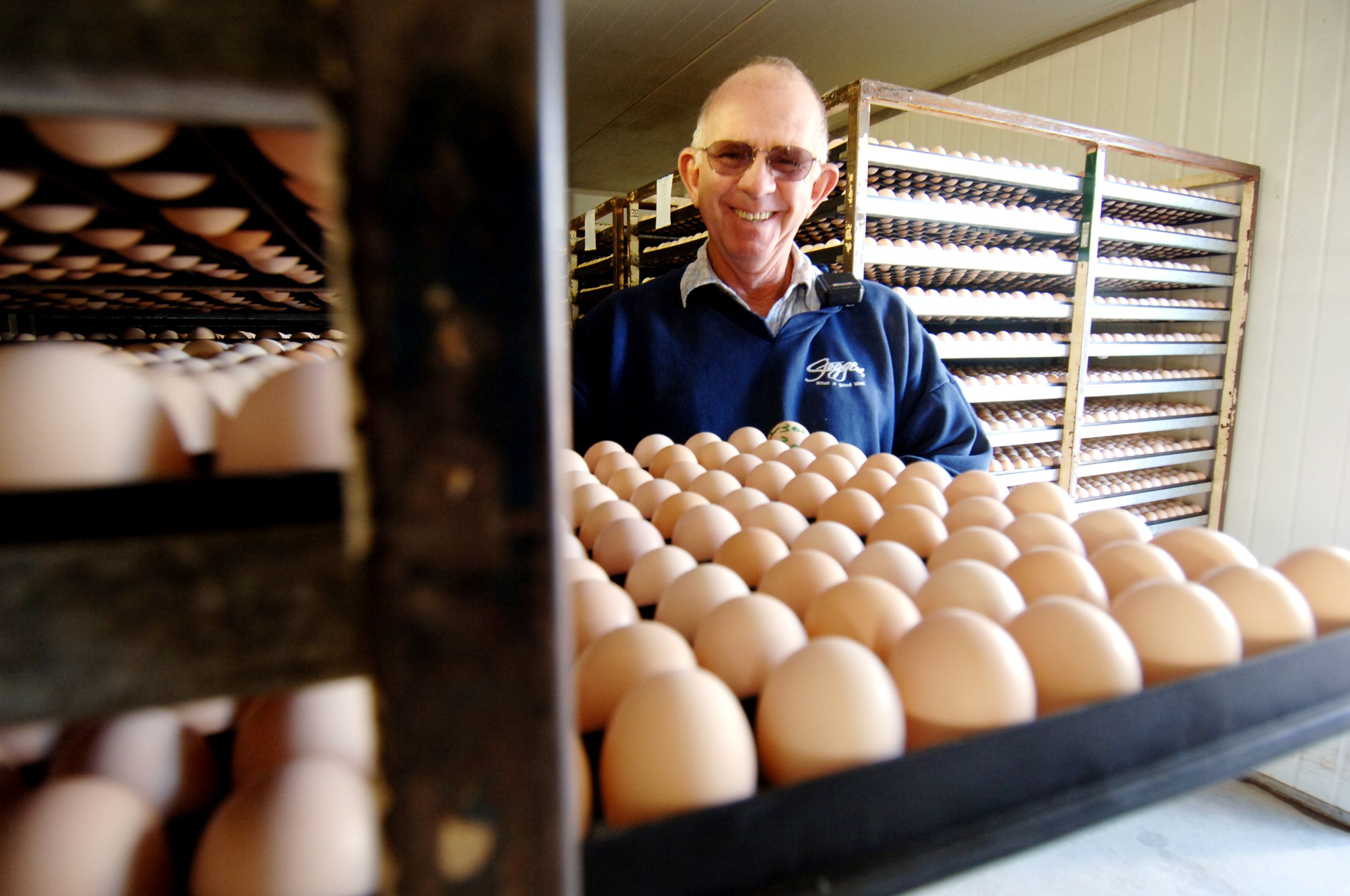
NSW increases minimum biosecurity standards
The NSW egg industry is raising biosecurity standards in an effort to ensure consumer confidence and maintain food safety.
In September 2018 Salmonella Enteritidis (SE) was detected in NSW layer flocks.
Since then NSW Department of Primary Industries, NSW Food Authority and Local Land Services have conducted a targeted program of surveillance and testing which has confirmed the presence of SE on 13 properties in NSW.
Industry have worked closely with government to help stabilise SE and Australian Eggs has produced a range of guidance materials to help reduce the risk.
To assist in raising biosecurity standards in the long term, a Biosecurity Control Order was issued on 1 August.
The Control Order applies to all persons in NSW that are in an area where eggs are produced, graded or packed, or poultry are bred, raised or kept for meat or egg production, on premises required to be licensed under the Food Act 2003 and Food Regulation 2015. It also applies to pullet rearing facilities.
Basic biosecurity measures required by the order include that all affected facilities implement a vermin control strategy, display biosecurity signage and provide shed boots or foot baths at the entrance to production areas.
Other measures to reduce the possible spread of Salmonella Enteritidis include provisions for the handling and storage of dead birds to prevent access by vermin and other animals, and for hand washing facilities or hand sanitiser to be provided at entrances to production areas.
The new rules will also require minimum levels of record keeping, including records of all persons entering poultry production facilities and written records of all deliveries to and from a property.
SE can survive in the environment for up to two years and investigations have shown that all properties confirmed to have been infected are interconnected in that people, eggs or equipment were moving between them.
The costs of improving biosecurity are also relatively small compared to managing an infection on a property.
Raising biosecurity standards is therefore crucial and will protect the egg and poultry industry from further spread, reduce human illness and maintain consumer confidence both now and into the future.
Compliance officers will visit every licensed egg and poultry production facility in NSW over the coming months.
They will assist facilities to meet the requirements of the Control Order and issue biosecurity signage free of charge.
The Control Order will remain in place for two years and anyone wanting more information can visit www.dpi.nsw.gov.au/SE

The Control Order will remain in place for two years and anyone wanting more information can visit www.dpi.nsw.gov.au/SE
The Control Order will remain in place for two years and anyone wanting more information can visit www.dpi.nsw.gov.au/SE
PLANTS

Inspections and audits
From April 2019 to June 2019, the Food Authority conducted 17 inspections and 25 audits of licensed plant product businesses. This industry sector has recorded an improvement in compliance rate of 95% over the previous financial year 2017-18.
The improvement in compliance rate was a result of the introduction of a targeted program to address critical, high-risk issues and poor performers which was identified from the audit results from the previous financial year. The main audit items that attracted increased monitoring from the Compliance & Integrity Systems unit were within Hygiene & sanitation, Construction & maintenance & Pre-requisite programs.
The below table shows yearly comparable data for compliance and audit activity in the plant sector between reporting years 2017/18 and 2018/19.
| Reporting period | 2017/18 | 2018/19 |
|---|---|---|
| Total audits | 127 | 105 |
| Total inspections | 54 | 54 |
| Compliance rate | 85% | 95% |
Melon Food Safety Resources
NSW Department of Primary Industries (DPI) has created new resources to assist melon growers minimise food safety risks. The basic principles that underpin food safety programs should be followed by all growers and packers.
The Melon Food Safety Best Practice Guide and Melon Food Safety Toolbox, outline the food safety principles and practices for pre and postharvest handling of melons.
The main purpose of this guide is to provide practical food safety resources for everyone involved in the supply chain so they have knowledge in identification, assessment and management of potential food safety hazards in growing and supplying melons. For more information visit www.foodauthority.nsw.gov.au/industry/plant-products
Review of the Plant Products Food Safety Scheme risk assessment
The previous risk assessment of the Plant Products Food Safety Scheme was published in April 2014. Reviews are required to be revised at five-year intervals during the revision of the NSW Food Regulation. Each five year review is conducted on an alternate basis, as either a full risk assessment or an update. A full risk assessment was conducted of any new or updated information following an environmental scan for issues that have impacted plant product food safety since 2014.Information sources included;
- published reports on foodborne illness outbreaks and recall data in Australia attributed to plant products,international issues arising from human illness or perceived hazards linked with plant products,
- risk assessments of plant products,
- emerging issues in the farm to consumer continuum for plant products relevant to health risk,
- research findings related to hazards in plant product production and processing,
- baseline surveys of microbiological and chemical hazards in plant products and,
- other relevant sources if identified during the above activities.
The 2019 risk assessment supports the continuation of the food safety scheme and notes familiar common problems and some emerging issues.
Recently there has been significant attention, globally and domestically, focused on the safety of fresh produce and plant products. It is likely that at the time of the next review, considerable progress will have been made in domestic and international research.
It is anticipated that this will lead to knowledge-led development and/or improvement of existing guidelines for industry, government-based standards and policies and, potentially novel interventions and technologies to improve food safety in this sector.
The full risk assessment is available on our website.
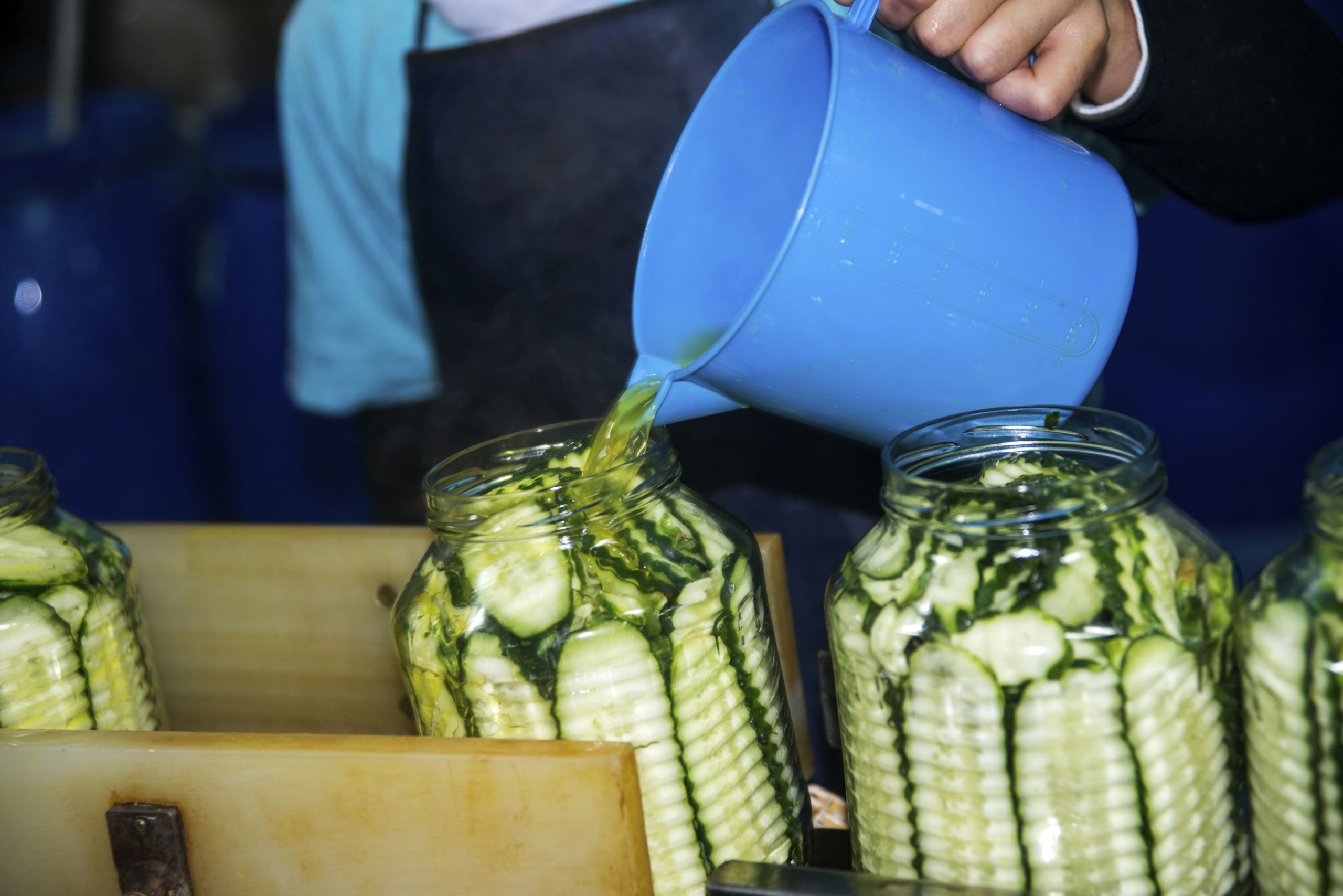
VULNERABLE PERSONS

Inspections and audits
From April 2019 to June 2019, the Food Authority conducted 45 inspections and 327 audits of licensed hospitals and aged care businesses. This industry sector has maintained a high compliance rate with 99% of businesses recording an acceptable result. This industry sector has maintained a high compliance rate for an extended period, due to the correct implementation of food safety controls and ensuring staff have the necessary skills and knowledge.
The below table shows yearly comparable data for compliance and audit activity in the vulnerable persons sector between reporting years 2017/18 and 2018/19.
| Reporting period | 2017/18 | 2018/19 |
|---|---|---|
| Total audits | 1349 | 1292 |
| Total inspections | 201 | 82 |
| Compliance rate | 98% | 99% |
PROSECUTIONS
Dumpling business fined for food safety breaches
The director of a Sydney dumpling business and the company itself Australia Yummy Pty Ltd have been fined $34,150 and $44,150 respectively and ordered to pay professional costs of $12,000 and $18,000 after its director pleaded guilty to 43 offences under the Food Act 2003 in the Downing Centre Local Court on Friday 28 June 2019.
The charges against the Belmore based company related to various hygiene and pest control offences, the breach of a Prohibition Order and providing false and misleading information to authorised officers.
A labelling complaint from a consumer led to an inspection of the premises, during which officers observed poor conditions with unclean fittings and equipment as well as live rodents, large amounts of rat excrement and a decomposed rat carcass on top of a machine in the processing area.
As a result of these observations Food Authority officers issued a Prohibition Order that ordered that the company immediately cease trading until it was deemed compliant by the Food Authority.
In a follow up inspection to the premises officers observed the business to still be trading, and had also failed to take steps to rectify the breaches of the Act that were previously identified.
After cleaning up its act, the company was subsequently issued a clearance certificate to trade but on a further follow up inspection was again found to be in breach of various hygiene and pest control requirements under the Food Act. A second Prohibition Order was issued to the business preventing it from trade.
Food Authority CEO Dr Lisa Szabo has welcomed the outcome.
“The vast majority of food businesses in NSW do the right thing, but for the few that fail to do so, we will take action to ensure the safety of food in ,” Dr Szabo said.
“Consumers have the right to have confidence and certainty that the food they buy and consume is manufactured and prepared in a clean and sanitary environment.”

PROCESSES
FSANZ call for submissions
Food Standards Australia New Zealand (FSANZ) has recently released a call for written submissions on the draft variation to the Code arising from the following applications:
- A1176 - Enzymatic production of Steviol Glycosides
To seek approval for a new specification for steviol glycosides produced by an enzymatic conversion method using enzymes derived from genetically modified strains of Escherichia coli (E. coli).
Written submissions are due by 6pm (Canberra time) 8 October 2019. Read more. - A1171 - Endo-inulinase from GM Aspergillus oryzae as a PA (Enzyme)
To permit the use of Endo-Inulinase produced from a GM modified strain of Aspergillus oryzae as a PA.
Written submission are due by 6pm (Canberra time) 17 October 2019. Read more.
*reproduced with permission from Food Standards Australia New Zealand
Calendar items
SEPTEMBER
Fine Food Australia, Sydney 9-12 September
Sydney Royal Taste of Excellence Awards, Sydney 24 September
NOVEMBER
Australian Food Safety Week 9-16 November. 2019 theme ‘Excellent eggs – handle them safely’





